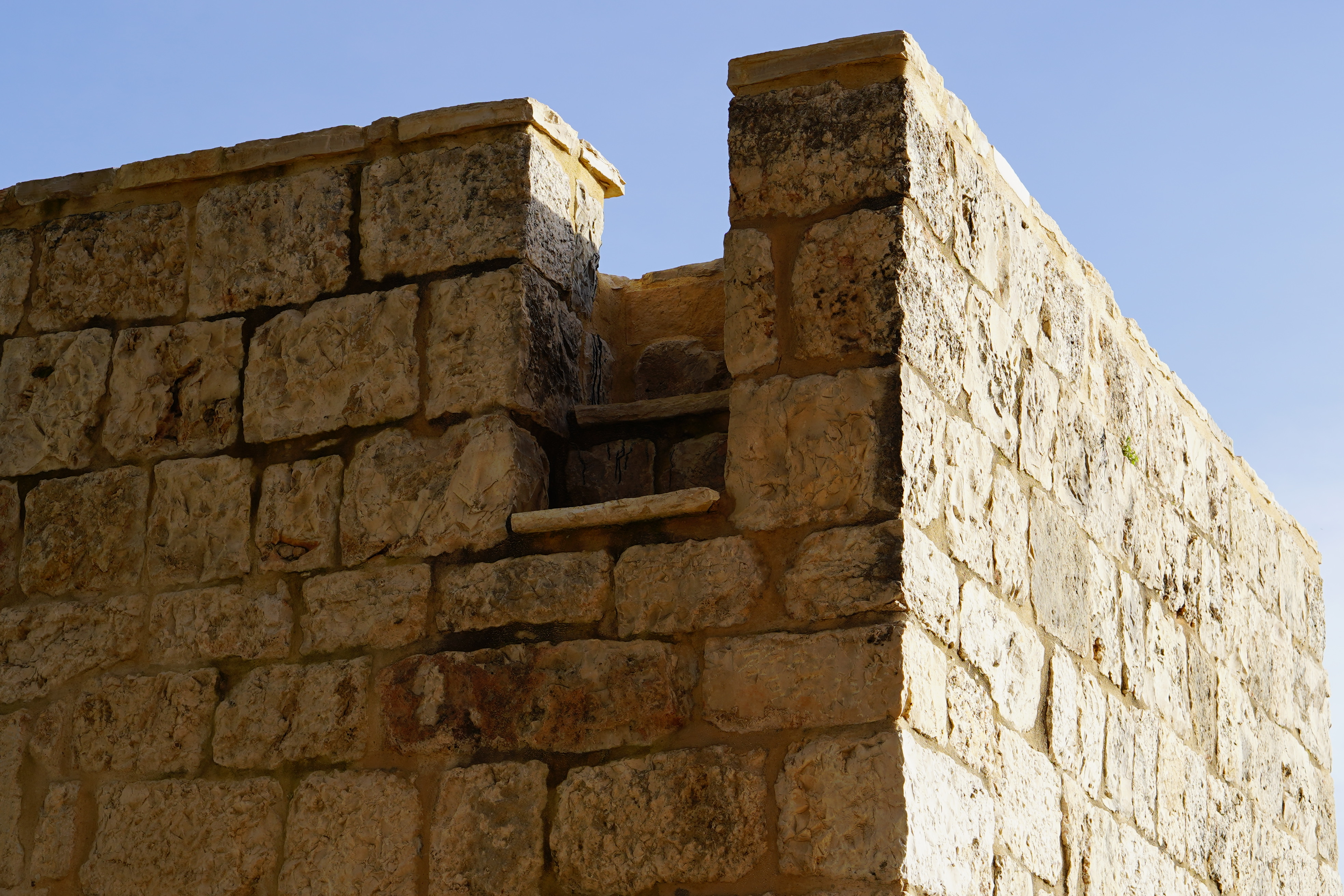 Dar Yusuf Nasri Jacir for Art and Research is a multi-faceted project devoted to educational, cultural, and agricultural exchanges in Bethlehem.
Dar Yusuf Nasri Jacir for Art and Research is a multi-faceted project devoted to educational, cultural, and agricultural exchanges in Bethlehem.Read More ︎
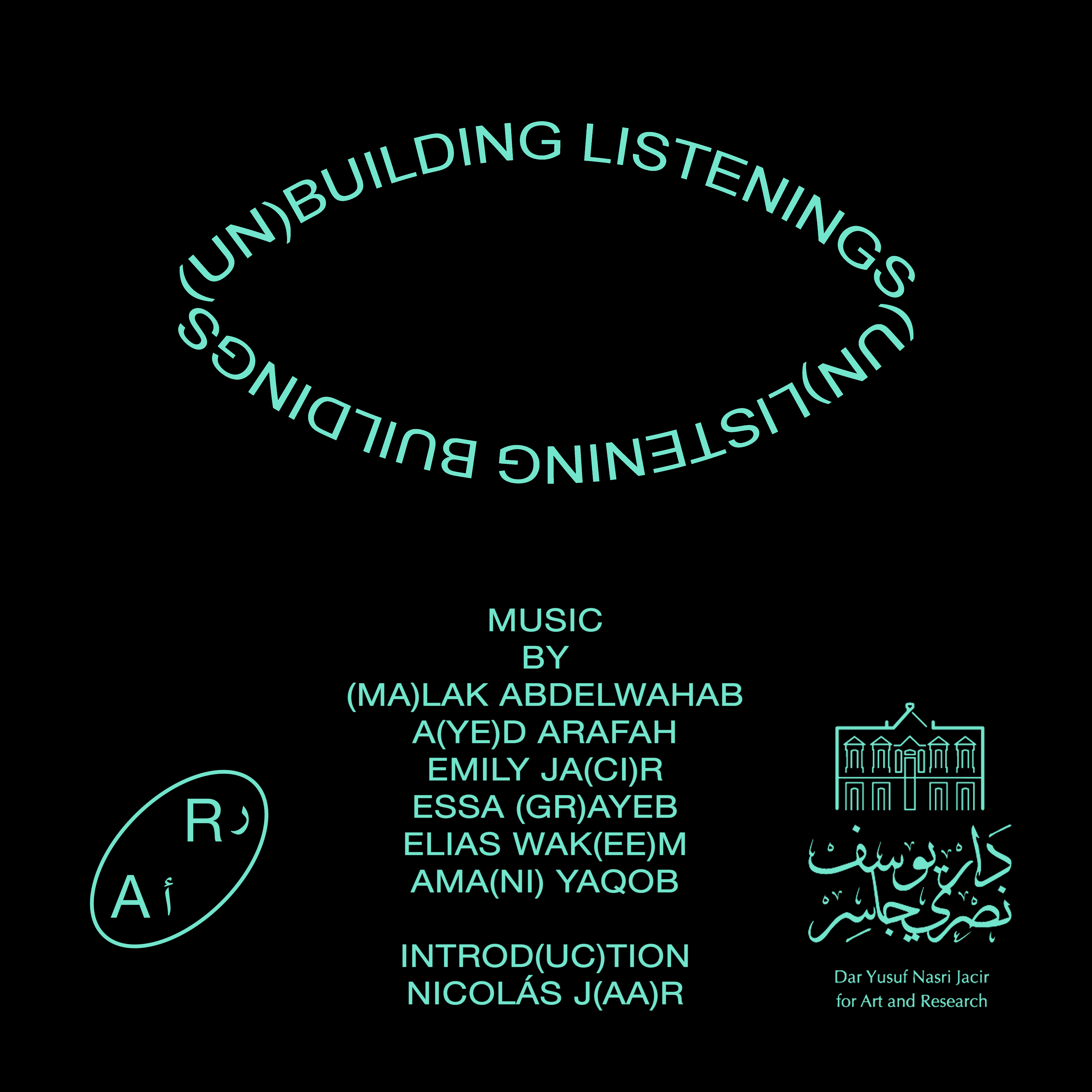
Featured:
(un)building listening radioshow
Nicolás Jaar
Nicolás Jaar introduces and plays extracts from some of the music made during his(un)building listening workshop at Dar Jacir in Bethlehem. Featuring sounds by workshop participants Malak Abdelwahab, Ayed Arafah, Emily Jacir, Essa Grayeb, Elias Wakeem and Amani Yaqob.
Listen HERE!
Dar Yusuf Nasri Jacir for Art and Research is a grass-roots independent artist–run initiative founded in 2014 and is located in our 19th century family home in Bethlehem. Originally built in the late 1880's by al Mukhtar Yusuf Jacir, the site serves as a place in which the history and contemporary conditions of Bethlehem meet, enabling the exchange and production of new art works and visions towards the future.
This multi-faceted project is devoted to educational, cultural, and agricultural activities. It is an experimental learning hub for the Bethlehem community and beyond – a place to ask questions, exchange ideas, to dream and to grapple with our contemporary situation.
Knowledge production and research are the key pillars behind Dar Jacir. Workshops, seminars and master classes are conducted to facilitate the circulation of creative and intellectual endeavors across a range of disciplines and media in particular art and cinema. Our residency program offers an opportunity for visiting international and local artists and scholars to live and work in Dar Jacir. Our mission includes reactivating the links between Bethlehem and her community in Latin America with a special focus on exchange with the half million Bethlehemites living in Santiago, Chile. In addition, Dar Jacir houses a research center devoted to our Ottoman archives – a vast collection of rare visual and textual material from the late nineteenth and early twentieth centuries. In the future, we plan on hosting scholars in Ottoman studies from around the world in addition to artists, academics, musicians and filmmakers to use these archives. We work in partnership with local and international organizations to disseminate and share programming to the widest possible audience.
This multi-faceted project is devoted to educational, cultural, and agricultural activities. It is an experimental learning hub for the Bethlehem community and beyond – a place to ask questions, exchange ideas, to dream and to grapple with our contemporary situation.
Knowledge production and research are the key pillars behind Dar Jacir. Workshops, seminars and master classes are conducted to facilitate the circulation of creative and intellectual endeavors across a range of disciplines and media in particular art and cinema. Our residency program offers an opportunity for visiting international and local artists and scholars to live and work in Dar Jacir. Our mission includes reactivating the links between Bethlehem and her community in Latin America with a special focus on exchange with the half million Bethlehemites living in Santiago, Chile. In addition, Dar Jacir houses a research center devoted to our Ottoman archives – a vast collection of rare visual and textual material from the late nineteenth and early twentieth centuries. In the future, we plan on hosting scholars in Ottoman studies from around the world in addition to artists, academics, musicians and filmmakers to use these archives. We work in partnership with local and international organizations to disseminate and share programming to the widest possible audience.
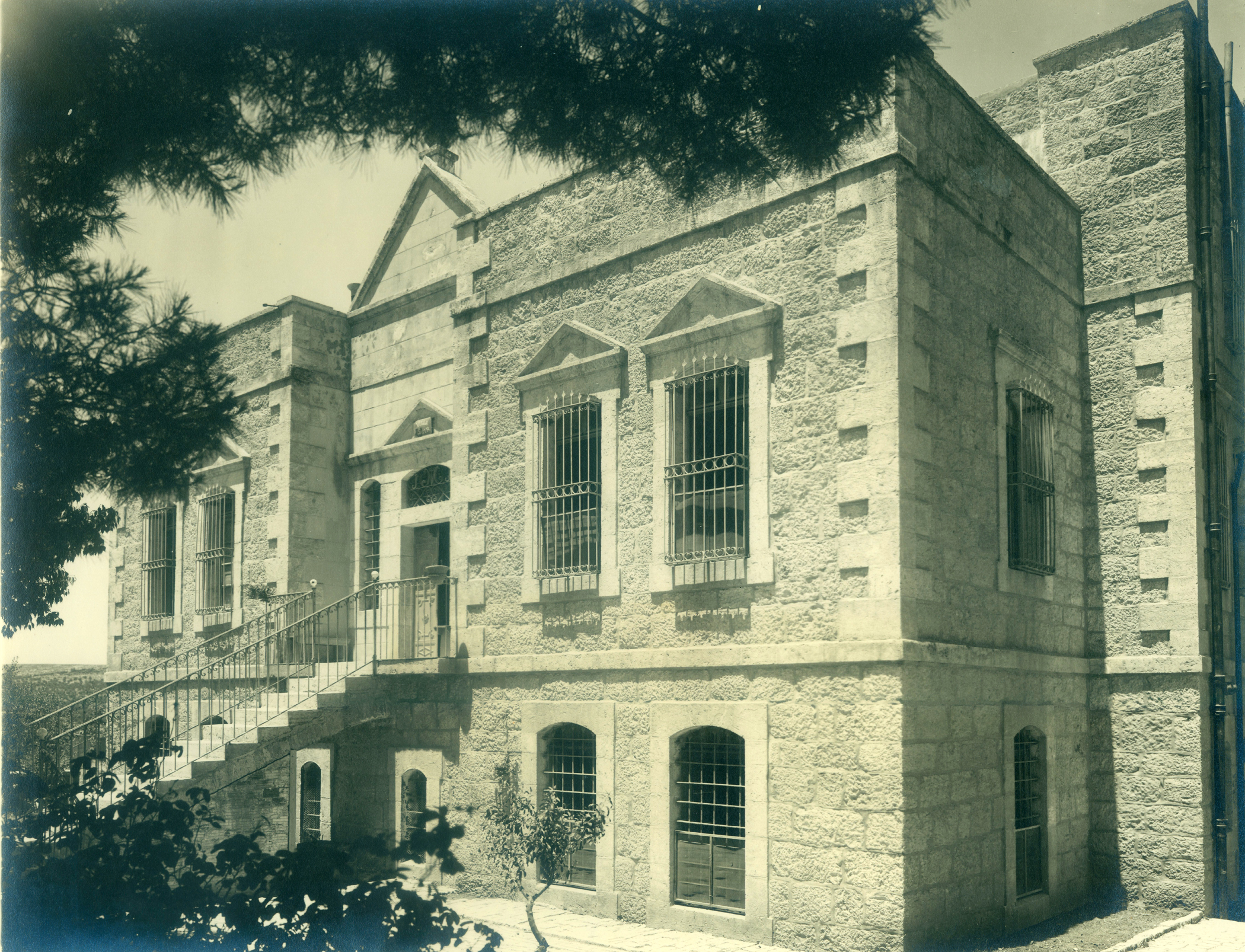 Dar Jacir photographed by Taufik Basil, Bethlehem, circa 1890. Dar Jacir Archives.
Dar Jacir photographed by Taufik Basil, Bethlehem, circa 1890. Dar Jacir Archives.
Dar Jacir was built in the late 1880’s by Yusuf Ibrahim Jacir, a mukhtar of Bethlehem. He was the town’s registrar and trustee because he kept a record of all newborns as well as the population of the city. He was also renowned for his skill and expertise in mother-of-pearl carving. The Jacir family is part of the Faraheeya clan, one of the original seven clans of Bethlehem.
The house was built as a residential home for the family and a place to welcome friends and family who came to visit from abroad, mainly from Europe and South and Central America. It was one of the first houses located at the main entrance to Bethlehem from Jerusalem on the historic Jerusalem-Hebron road. In addition to the main house, a small stone structure was built to store food and other goods. The land around the house consists of a beautiful garden with olive trees, and typical traditional Palestinian stone terraces. The sanasil (the stone retaining walls) were recently restored as part of the renovation of Dar Jacir, as were the wrought iron gate and other ironwork.
Since its early days the house has witnessed family weddings, festivities, celebrations, family births, sad moments of family passage, reunions, as well as national uprisings and historic events in Palestine.
Yusuf was the father of Suleiman Jacir, known for his courage and generosity, and his great compassion for the needy. He was twice elected as Bethlehem mayor in 1899-1903 and 1903-1907. Suleiman held the rank of a “mir miran,” which was an Ottoman equivalent to a governor. Suleiman and his brothers became successful merchants internationally with offices in Bethlehem, Barranquilla, Beirut and Paris.
The house remained the main Jacir residence during the construction next door of the Suleiman Jacir palace from 1910 to 1914. Every week Suleiman and his family served food to passersby and those in need. Everyone was welcome and people came from far and wide knowing they would be received. Until today the famous saying “يهووو الفتيت في دار جاسر (the food is at Dar Jacir)” still resonates with those from the area and beyond. The house witnessed the changing of control over Palestine from Ottoman rule to the British Mandate.
When the family went bankrupt in 1929, the Suleiman Jacir Palace as well as the original Jacir home, were lost to the family. Everything was sold in an auction, which also included most of their furniture and belongings. In the aftermath, Suleiman and his wife and children were the only ones who remained in Bethlehem.
The British authorities used the Suleiman Jacir Palace as a prison and British Army HQ, the original Dar Jacir home next door was purchased by the Qawwas family.
After the 1948 Nakba, the Suleiman Jacir Palace became Al Ummah Secondary School, when the school was forced to move from Jerusalem’s Al Baka neighborhood to Bethlehem and Dar Jacir became the residence of the superintendent of Al Ummah as well as a home for the school’s boarders. During this period under Jordanian rule Mukhtar Yusuf Ibrahim Jacir’s grandson, Nasri Suleiman Jacir, became a teacher at this school.
In the 1960s, the Jacir Palace became the Government Secondary School for boys, “Al Wataniya”, for the Bethlehem district, and the original Dar Jacir house next door was used as a laboratory for the school’s science department. Later the Palace became the Government School for Girls.
By 1980, Nasri Suleiman Jacir, who was the only Jacir still living in Bethlehem, managed to finally buy back the original home. He was able to do so by paying for it in installments over the course of his lifetime, thanks to the generosity of the owner the late Hanna Qawwas who offered him the possibility to do this. From 1980 to 1996, the house was inhabited once again by its owners, Nasri and Marguerite Jacir, until they both passed away.
In 2014, Yusuf Nasri Jacir, the grandson of Suleiman Jacir, bought his siblings’ shares of the house and became the sole owner. Yusuf decided to convert it to an art and research center to serve the Bethlehem area and the Palestinian communities in Palestine as well as overseas in the diaspora. It was his dream to be able to give back to his little town of Bethlehem, the place he was born and raised and will always love.
The house was built as a residential home for the family and a place to welcome friends and family who came to visit from abroad, mainly from Europe and South and Central America. It was one of the first houses located at the main entrance to Bethlehem from Jerusalem on the historic Jerusalem-Hebron road. In addition to the main house, a small stone structure was built to store food and other goods. The land around the house consists of a beautiful garden with olive trees, and typical traditional Palestinian stone terraces. The sanasil (the stone retaining walls) were recently restored as part of the renovation of Dar Jacir, as were the wrought iron gate and other ironwork.
Since its early days the house has witnessed family weddings, festivities, celebrations, family births, sad moments of family passage, reunions, as well as national uprisings and historic events in Palestine.
Yusuf was the father of Suleiman Jacir, known for his courage and generosity, and his great compassion for the needy. He was twice elected as Bethlehem mayor in 1899-1903 and 1903-1907. Suleiman held the rank of a “mir miran,” which was an Ottoman equivalent to a governor. Suleiman and his brothers became successful merchants internationally with offices in Bethlehem, Barranquilla, Beirut and Paris.
The house remained the main Jacir residence during the construction next door of the Suleiman Jacir palace from 1910 to 1914. Every week Suleiman and his family served food to passersby and those in need. Everyone was welcome and people came from far and wide knowing they would be received. Until today the famous saying “يهووو الفتيت في دار جاسر (the food is at Dar Jacir)” still resonates with those from the area and beyond. The house witnessed the changing of control over Palestine from Ottoman rule to the British Mandate.
When the family went bankrupt in 1929, the Suleiman Jacir Palace as well as the original Jacir home, were lost to the family. Everything was sold in an auction, which also included most of their furniture and belongings. In the aftermath, Suleiman and his wife and children were the only ones who remained in Bethlehem.
The British authorities used the Suleiman Jacir Palace as a prison and British Army HQ, the original Dar Jacir home next door was purchased by the Qawwas family.
After the 1948 Nakba, the Suleiman Jacir Palace became Al Ummah Secondary School, when the school was forced to move from Jerusalem’s Al Baka neighborhood to Bethlehem and Dar Jacir became the residence of the superintendent of Al Ummah as well as a home for the school’s boarders. During this period under Jordanian rule Mukhtar Yusuf Ibrahim Jacir’s grandson, Nasri Suleiman Jacir, became a teacher at this school.
In the 1960s, the Jacir Palace became the Government Secondary School for boys, “Al Wataniya”, for the Bethlehem district, and the original Dar Jacir house next door was used as a laboratory for the school’s science department. Later the Palace became the Government School for Girls.
By 1980, Nasri Suleiman Jacir, who was the only Jacir still living in Bethlehem, managed to finally buy back the original home. He was able to do so by paying for it in installments over the course of his lifetime, thanks to the generosity of the owner the late Hanna Qawwas who offered him the possibility to do this. From 1980 to 1996, the house was inhabited once again by its owners, Nasri and Marguerite Jacir, until they both passed away.
In 2014, Yusuf Nasri Jacir, the grandson of Suleiman Jacir, bought his siblings’ shares of the house and became the sole owner. Yusuf decided to convert it to an art and research center to serve the Bethlehem area and the Palestinian communities in Palestine as well as overseas in the diaspora. It was his dream to be able to give back to his little town of Bethlehem, the place he was born and raised and will always love.
Emily Jacir, Co-founder and Founding Director of Dar Yusuf Nasri Jacir for Art and Research
Emily is an artist whose work—which spans a range of strategies including film, photography, sculpture, interventions, archiving, performance, video, writing, and sound—investigates histories of colonization, exchange, questions of translation, transformation, resistance, and movement.
She is the recipient of numerous prestigious awards including a Golden Lion at the 52nd Venice Biennale (2007); a Prince Claus Award from the Prince Claus Fund in The Hague (2007); the Hugo Boss Prize at the Guggenheim Museum (2008); the Alpert Award (2011) from the Herb Alpert Foundation; and the Andrew W. Mellon Foundation Rome Prize Fellowship at the American Academy in Rome (2015).
Her recent solo exhibitions include Alexander and Bonin, New York (2018); IMMA (Irish Museum of Modern Art), Dublin (2016–17); Whitechapel Gallery, London (2015); Darat al Funun, Amman (2014–15); Beirut Art Center (2010); and the Guggenheim Museum, New York (2009). Her work has been regularly featured in major international group exhibitions, including at The Museum of Modern Art, New York; the San Francisco Museum of Modern Art; Fondazione Sandretto Re Rebaudengo, Turin; dOCUMENTA (13) (2012); five consecutive Venice Biennales; Sharjah Biennial 10 (2011); 29th Bienal de São Paulo, Brazil (2010); 15th Biennale of Sydney (2006); Sharjah Biennial 7 (2005); Whitney Biennial (2004); and 8th Istanbul Biennial (2003).
Emily has been actively involved in education in Palestine since 2000 and is deeply invested in creating alternative spaces of knowledge production. She recently served as curator of the Young Artist of the Year Award 2018 at the A. M. Qattan Foundation in Ramallah which she entitled “We Shall be Monsters”. She is one of the founders of the International Academy of Art Palestine in Ramallah and was a full-time professor there from 2007 to 2017 and served on its academic board from 2006 to 2012. Jacir led the inaugural year (2011–12) of the Ashkal Alwan Home Workspace Program in Beirut and created the curriculum and programming; she also served on its curricular committee from 2010 to 2011. Between 1999 and 2002, she curated several Arab and Palestinian film programs in New York City with Alwan for the Arts while also teaching several workshops at Birzeit University. She conceived of and co-curated the first Palestine International Video Festival in Ramallah in 2002. In 2007, she curated a selection of shorts, “Palestinian Revolution Cinema (1968–1982),” which went on tour internationally.
Annemarie Jacir, Co-founder
Annemarie has written, directed and produced over sixteen films. Two of her films have premiered as Official Selections in Cannes, one in Berlin and in Venice, Locarno, and Telluride. All three of her feature films were Palestine's official Oscar entries.
With a commitment to teaching, training and hiring locally, Annemarie also curates and mentors, actively promoting independent cinema in the region. Founder of Philistine Films, she collaborates regularly with fellow filmmakers as an editor, screenwriter and producer.
In 2003, she co-founded the Dreams of a Nation project and organized the largest traveling film festival in Palestine, which included the screening of archival Palestinian revolutionary films screening for the first time on Palestinian soil. She has taught at Columbia, Bethlehem, Birzeit University and in refugee camps in Palestine, Lebanon and Jordan. In 2011, Chinese director Zhang Yimou selected her to be his first protégée as part of the Rolex Arts Initiative. In 2018, she was invited to join the Academy of Motion Picture Arts and Sciences and also served on the jury of the Cannes Film Festival.
Yusuf Nasri Jacir, Co-founder
Yusuf was born in Bethlehem and grew up in Dar Jacir . He attended primary school at the Freres School in Bethlehem, graduated from Terra Sancta Secondary High School and studied for one year at Bir Zeit College. He taught English to primary school students at the Freres College in Bethlehem for two years.
He then worked in Hebron from 1962 until 1969 for UNRWA as the Area Welfare Officer for the Hebron and Bethlehem districts. In this position, he was in charge of social and welfare activities including supervision of case work; handicapped programs; distribution of food and medical supplies; directing and supervising boys’ youth activities centers and sewing centers for girls as well as after school activities at all those centers: Arroub, Fawwar, Deheisheh, Aida, and Azzeh camps. In this position he supervised case workers, youth leaders, sewing centers instructors and community workers.
The Area Welfare Officer job gave Yusuf the opportunity to travel to the USA for the first time in 1966 as a representative of Jordan to the Chicago International Program for Youth Leaders and Social Workers. After the 1967 Naksa, he worked in Chicago for two years as a social worker and youth advisor for minority children at a community house on Chicago’ s west side and for six years in finance at the Quaker Oats Company. While working full time he put himself through College at the age of 33.
He obtained a BA degree with Honors from Roosevelt University and an MBA from the University of Chicago. Yusuf then worked internationally as a financial controller in Saudi Arabia for multiple companies owned by the Mawarid Group among many others. He is currently a consultant and financial advisor in Riyadh and is serving as Treasurer and Board Member of the Advanced Learning School in Riyadh. He was a member of the American Business Group Board in Riyadh from 1990 to 1998.
Aline Khoury, Programs Director
Aline Khoury is a cultural manager, producer and researcher living and working in Palestine. Aline has worked with several arts and cultural organizations across Palestine; managing spaces, producing exhibitions and public programs, as well developing institutional partnerships and strategies. She was involved in several local and international networks, including Qalandiya International, Shafaq- Jerusalem Arts Network, and Arts Collaboratory. She studied History of Art and Social-Anthropology (B.A.) in Jerusalem, and Aural & Visual Cultures (M.A.) in Goldsmiths University, London.
Nicolás Jaar, Sound Residency Program
Since 2008, Nicolás Jaar has released music under various guises spanning shades of pop, ambient, noise, and club music. Since 2013, he has curated the Other People label, releasing the visual & audio work of artists Africanus Okokon, Jena Myung, Maziyar Pahlevan and the music of Aho Ssan, Saint Abdullah, Dienne, and Lydia Lunch among others. He is a current member of performance ensemble ¡miércoles! Alongside choreographer Stéphanie Janaina, and part of the band Darkside. In 2019, Jaar assembled the Shock Forest Group, a collective which has been exploring the myriad layers of colonial, ecological and institutional violence that interlink on the site of a forest built to be bombed in Zandaam, NL. In 2018, Jaar transformed Dar Jacir’s food shack in Bethlehem, Palestine, into a sound studio where he has held sound workshops for children and artist residencies. In recent years, Nicolás has mainly focused on education, teaching sound-editing and listening workshops to emerging musicians and non-musicians alike in institutions such as the Museo de la Memoria in Santiago, Chile, AdBK in Munich, Germany, free.wav in Attappadi, India, Festival 4x4, Chiapas, Mexico, Dar Jacir and Alrowwad in Bethlehem, Palestine, among others. Nicolás is a Capricorn and once walked from Turin to Marseille.
Lina Bani Odeh, Office Manager
Lina Bani Odeh is an artist living and working in Palestine. After finishing her B.A. in Contemporary Visual Arts at the International Art Academy - Palestine, she continued her career working as a project coordinator and office manager with various cultural organizations and festivals in Palestine, including Khalil Sakakini Cultural Center (Ramallah) and Qalandiya International. She works in managing art spaces, organizing workshops, as well as producing projects and exhibitions with Palestinian and international artists.
Ala’ Abed, Communications and Program Coordinator
Ala’ Abed (b. 1998 Jerusalem), working as a communications and program coordinator in Dar Yusuf Nasri Jacir since September of 2023. Her educational background includes a Bachelor's Degree from Birzeit University, majoring in English Language and Literature with a minor in Translation. Ala’ has cultivated a passion for photography, languages, writing memoirs, and cross-cultural communication, and has been working as a freelance translator in Arabic, English, and Turkish since 2021, she also works as a part-time remote executive assistant and event coordinator for Global Hope 365 in California.
Ala’ has been working in the cultural sector in Palestine since obtaining her BA. She worked in A.M. Qattan Foundation as an intern and a full-time employee in Ramallah before relocating to Bethlehem.
Reem Khatib, Program Coordinator and Sound Studio Manager
Reem Khatib (1999), born in Jerusalem, holds a bachelor's degree in English literature coupled with a minor in translation and is currently completing her master's degree in sociology, both at Birzeit University. Besides their role at Dar Yusef Nasri Jacir as programme coordinator and sound studio manager since October 2023, Reem previously worked as an English teacher for adult beginners. Their language proficiency and translation expertise have been honed through various projects, including collaborating with organisations like Metras Global, Al Qaws, and Al Daleel, alongside interpretation abilities and transcription services.
Passionate about exploring the intersections between literature, culture, and society, Reem actively participates in a variety of activities, including volunteering with youth centres such as IPYL, tour-guiding workshops at the Saraya Centre for Community Service (Jerusalem, the old city), and music workshops. They have been participating in many activities organised by Dar Yusuf Nasri Jacir for Art and Research. They developed an interest in music at a young age and are familiar with multiple musical instruments. Reem participated in (Un)building Listenings workshop with Nicolas Jaar in May–July 2022. Using skills they acquired from the workshop and working with Ableton software, Reem co-founded the Palestine Beats workshop in collaboration with Valeri Orth, music teacher at Berkley University, facilitating songwriting, beat-making, and compassionate communication for 20 participants from cities around Palestine.
Walid Al Wawi, Website
Walid Al Wawi is a Jordanian Palestinian-native, working in painting, performance, video and installation. He received critical acclaim for his academic and purest approach to objects and physical documentation that dialogue with the political and cultural identity of the Palestinian body in diaspora, it’s implication on the post colonialist dream of pan Arabism and vice versa.
In 2011 Al Wawi was awarded The Shiekha Manal Young Artist Award, followed by a scholarship from the Shiekh Salama Art Fellowship which earned him his masters degree in Fine Arts by Central Saint Martins, University of Arts London. Through out his practice Walid has had solo exhibitions at Art16 London, DUCTAC, and JamJar in Dubai; group shows at Jameel Art Center UAE, Darat Al Funun Jordan, Qattan Art Foundation Palestine, MMCA Seoul, XX Bienal Santa Cruz, FIAC France, Incubarte Spain, Abudhabi Art and Art Dubai UAE; and was a resident with The Museum of Modern and Contemporary Art in South Korea.
Walid is the founder of “Samt for Art and Research” a virtual foundation that manifests primarily in a digital format through Samt.co. Its strict online presence is set to further its goal of democratising art accessibility and pushing the boundaries of the physically confined white space to a more contemporary and digital approach; opening the receptivity of art and discourse from Southwestern Asia and North Africa to an international audience from all regions with no geo-political restrictions on humans or art.
Since it’s establishment through Samt, Walid mentored and curated the works of numerous aspiring artists from the MENA and collaborated with the Tate Exchange, Darat AlFunun and many other renowned galleries and foundations around the globe.
Qais Assali, Volunteer
Qais Assali (b. 1987 Nablus) is an artist, designer and educator. His works with photography, video, installation, lecture performance, graphic design, and in the archives seek to engage and subvert national geopolitical power dynamics. His interdisciplinary work stages questions between site and the body in relation to his own identity and locale in order to debunk metaphoric surrounding contested geographies.
His work has been exhibited at the Chicago Cultural Center; Rashid Diab Arts Centre, Khartoum; SculptureCenter, New York; Darat al Funun’s Lab, Amman; Jeune création, Paris; Festival Artes Vertentes de Tiradentes, Brazil; Temporary Art Centre, Eindhoven; 6018North, Chicago, solo exhibitions at Akademirommet, Kunstnernes Hus, Oslo; Khan Al Wakala, Nablus; and Michigan State University Union Art Gallery.
Assali has been teaching at a number of academic institutions in Palestine, recently was a Visiting Assistant Professor for the Critical Race Studies Program at Michigan State University 2018-19, and currently a Core Fellow at the Museum of Fine Arts, Houston. After his graduation from the International Academy of Art Palestine, he pursued and holds an MFA in Studio Art from Bard College, New York and an MA in Art Education from the School of the Art Institute of Chicago.
Hamza Badran, Volunteer
Hamza Badran (b.1993)s a film maker and visual artist based in Basel, received a BA in contemporary visual art from the International Academy of Art-Palestine in 2018, and he is currently attending a master program in Fine Art at KunstInstitute HGK-FHNW in Basel
Advisory Council
Abdelfattah Abusrour, Adila Laïdi-Hanieh, Jorge Tacla, Sari Khoury, Hassan Muamar, George Al'ama, Diana Buttu, Zahi Khoury
The following individuals have contributed to the founding of Dar Jacir as an organization and while they have moved on to other things they have remained an integral part of our family:
Motasem Al-Ghnimat, Project Coordinator, 2018 – 2019
Samer Al-Barbari, Custodian/Groundskeeper/Chef, 2018 – 2019
Hassan Muamer, Site Engineer, 2018 - 2019
Susanna Gonzo, Intern, Spring 2019
Abeer Saadeh , Admin and Finance Officer 2018
Ibrahim Burnat, Coordinator, 2018
Khaled Hourani Advisory Council 2017 - 2019
Dyala Husseini Advisory Council 2017 - 2019
Dar Jacir has participated in symposiums, exhibitions, and festivals around the world, including:
SOUTH WEST BANK – Landworks, Collective Action and Sound. Venice Biennale (2024)
Art Spaces and Institutions as Sites of Futurity. March Meeting Tawashujat, Sharjah (2024)
Drifting Archipelagos ARCO Madrid (2023)
Tools for Solidarity with Resolve Collective. Shubbak Festival, London (2023)
Our street in the middle of our house:Transversal Methodologies and Decolonial Practices at Dar Jacir. CiMAM Keynote at Annual Conference (Spain, 2022)
MANIFESTIAMO. Villa Romana (Italy, 2022)
National College of Art and Design (Dublin, 2022)
Representation, Accountability and Solidarity in Institutions and the Artists they Serve. Rethinking Residencies (New York, 2021)
Home Sweet Home. KORA-Contemporary Arts Center (Castrignano de Greci (Salento), 2021)
Experimenter Curator’s Hub (Kolkata, 2021)
Awards
2019 Visible Award Finalist
2018 KADIST CIRCLE AWARD Winner
2018–20 Jane Lombard Prize for Art and Social Justice – one of the 5 finalists
Selected Press
2024
Mirzoeff, Nicholas ‘Palestine Everywhere’, The Week In White Site, (6, May, 2024)
Carolin, Clare, ‘South West Bank: Venice Biennale exhibition explores how Palestinians have become ‘foreigners everywhere’ The Conversation, (30 April, 2024)
Morell, Naimai, ‘Palestine is everywhere at the Venice Biennale this year’, Middle East Monitor (26 April, 2024)
Acre, Susant, ‘Collateral Visions: Six Best Off-Site Exhibitions in Venice’, Ocula Magazine (24 April, 2024)
Ghosh, Ravi, ‘Venice Biennale photography review: Is truth enough?’, British Journal of Photography (24 April, 2024)
Turner, Jonathan, ‘SOUTH WEST BANK. Landworks, Collective Action and Sound’, Universes in Universe, (20 April, 2024)
Tancred, Jo Lawson, ‘A Powerful Collateral Show in Venice Highlights Palestinians’ Lived Experiences’, artnet (19 April, 2024)
Higgins, Charlotte, ‘‘No death in Venice’: Israel-Gaza tensions infiltrate biennale’, The Guardian (19 April, 2024)
Estiler, Keith, ‘Palestinian Voices Shine Despite Absence of National Pavilion at Venice Biennale’, HYPEBEAST (19 April, 2024)
Bruno, Gilda, ‘What to See at the 60th Venice Biennale – Elephant Roundup’, Elephant (16 April, 2024)
Tancred, Jo Lawson, ‘Here Are 6 Things You Need to Know Going Into Venice Biennale’, artnet (14 April, 2024)
Greenberger, Alex, ‘10 Shows to See in Venice During the Biennale, From a Pierre Huyghe Blockbuster to Art About Palestine’, ARTnews (11 April, 2024)
Hickley, Catherine, ‘War, refugees, destruction: how Venice Biennale 2024 will reflect our era’, The Art Newspaper (5 April 2024)
2023
Eve Anderson, Amber, ‘Postcards from Palestine’, BmoreArt(20 December, 2023)
‘National College of Art and Design awards inaugural Honorary Doctorate to internationally renowned artist Emily Jacir’, National College of Art and Design (1 December, 2023)
Arrendondo, Brittany, ‘Fostering Justice & Addressing Racism in Art Residencies: A Compassionate Approach’, Subverting Mobility (13 November, 2023)
‘Al Dar Jacir di Betlemme “Il Mare in Mezzo”: canti, musiche e danze italo-palestinesi', Pagine Esteri (16 September, 2023)
SOUTH WEST BANK – Landworks, Collective Action and Sound. Venice Biennale (2024)
Art Spaces and Institutions as Sites of Futurity. March Meeting Tawashujat, Sharjah (2024)
Drifting Archipelagos ARCO Madrid (2023)
Tools for Solidarity with Resolve Collective. Shubbak Festival, London (2023)
Our street in the middle of our house:Transversal Methodologies and Decolonial Practices at Dar Jacir. CiMAM Keynote at Annual Conference (Spain, 2022)
MANIFESTIAMO. Villa Romana (Italy, 2022)
National College of Art and Design (Dublin, 2022)
Representation, Accountability and Solidarity in Institutions and the Artists they Serve. Rethinking Residencies (New York, 2021)
Home Sweet Home. KORA-Contemporary Arts Center (Castrignano de Greci (Salento), 2021)
Experimenter Curator’s Hub (Kolkata, 2021)
Awards
2019 Visible Award Finalist
2018 KADIST CIRCLE AWARD Winner
2018–20 Jane Lombard Prize for Art and Social Justice – one of the 5 finalists
Selected Press
2024
Mirzoeff, Nicholas ‘Palestine Everywhere’, The Week In White Site, (6, May, 2024)
Carolin, Clare, ‘South West Bank: Venice Biennale exhibition explores how Palestinians have become ‘foreigners everywhere’ The Conversation, (30 April, 2024)
Morell, Naimai, ‘Palestine is everywhere at the Venice Biennale this year’, Middle East Monitor (26 April, 2024)
Acre, Susant, ‘Collateral Visions: Six Best Off-Site Exhibitions in Venice’, Ocula Magazine (24 April, 2024)
Ghosh, Ravi, ‘Venice Biennale photography review: Is truth enough?’, British Journal of Photography (24 April, 2024)
Turner, Jonathan, ‘SOUTH WEST BANK. Landworks, Collective Action and Sound’, Universes in Universe, (20 April, 2024)
Tancred, Jo Lawson, ‘A Powerful Collateral Show in Venice Highlights Palestinians’ Lived Experiences’, artnet (19 April, 2024)
Higgins, Charlotte, ‘‘No death in Venice’: Israel-Gaza tensions infiltrate biennale’, The Guardian (19 April, 2024)
Estiler, Keith, ‘Palestinian Voices Shine Despite Absence of National Pavilion at Venice Biennale’, HYPEBEAST (19 April, 2024)
Bruno, Gilda, ‘What to See at the 60th Venice Biennale – Elephant Roundup’, Elephant (16 April, 2024)
Tancred, Jo Lawson, ‘Here Are 6 Things You Need to Know Going Into Venice Biennale’, artnet (14 April, 2024)
Greenberger, Alex, ‘10 Shows to See in Venice During the Biennale, From a Pierre Huyghe Blockbuster to Art About Palestine’, ARTnews (11 April, 2024)
Hickley, Catherine, ‘War, refugees, destruction: how Venice Biennale 2024 will reflect our era’, The Art Newspaper (5 April 2024)
2023
Eve Anderson, Amber, ‘Postcards from Palestine’, BmoreArt(20 December, 2023)
‘National College of Art and Design awards inaugural Honorary Doctorate to internationally renowned artist Emily Jacir’, National College of Art and Design (1 December, 2023)
Arrendondo, Brittany, ‘Fostering Justice & Addressing Racism in Art Residencies: A Compassionate Approach’, Subverting Mobility (13 November, 2023)
‘Al Dar Jacir di Betlemme “Il Mare in Mezzo”: canti, musiche e danze italo-palestinesi', Pagine Esteri (16 September, 2023)
Saracino, da Cosimo, ‘Coreutica, residenza artistica sulle danze e le musiche nel Mediterraneo’, Qui Mesagne (20 July, 2023)
‘San Vito dei Normanni, “Coreutica”: dal 17 al 23 luglio la residenza artistica’, Puglia News 24 (17 July, 2023)
‘Suoni e danze del Mediterraneo, a San Vito tornano i laboratori e le ronde di “Coreutica”’, Brindisi Report (15 July, 2023)
Lei, John, ‘10 of the Best International Art Residencies Around the World’, Subverting Mobility(30 June, 2023)
‘British Council announces seven new projects from the Cultural Protection Fund’, British Council (11 May, 2023)
Okay, Ayca, ‘Inquiring ‘The Attentive Museum – Permeable Practices for a Common Ground’’, stir world (11 January, 2023)
2022
‘The Art from Dar Jacir’, This Is Palestine – Institute of Middle East Understanding (15 September, 2022)
‘The Attentive Museum – Permeable Practices for a Common Ground’, e-flux (8 June, 2022)
‘MANIFESTIAMO’, e-flux (22 April, 2022)
2021
D’Souza, Aruna, ‘At a Cultural Hub in Bethlehem, Art Thrives in the Fray’, The New York Times (15 July, 2021)
Hearst, Katherine, ‘The artists fighting Israel’s crackdown on culture’, Middle East Eye (11 July, 2021)
Nugara, Silvia, ‘Dalla finestra della mia casa di Betlemme’, il manifesto (20 June, 2021)
“Space, Culture and Connection: Palestinian Artists on Acts of Resistance”, Frieze (19 June, 2021)
“Dar Jacir Fundraiser Boosts Target”, Art Asia Pacific (18 June, 2021)
Bishara, Hakim, ‘Supporters Raise over $30K for Bethlehem Arts Center Raided by Israeli Soldiers’, Hyperallergic (14 June, 2021)
“Artists launch fundraiser in support of looted West Bank arts center Dar Jacir”, Artforum (14 June, 2021)
Panegyres, Markela, ‘We need to hear – and share – the voices of Palestinian artists’, green left (4 June, 2021)
“Come l’anguria è diventata un simbolo della resistenza palestinese”, InfoPal news agency (2 June, 2021)
Ditmars, Hadani, ‘As Palestinians Rebuild Following the Latest War Between Israel and Hamas, Housing Will Take Center Stage’, Architectural Digest (30 May, 2021)
Wilson-Goldie, Kaelen, ‘Freedom Songs’, ArtForum (30 May, 2021)
Quilty, Jim, ‘Three notes from an occupied territory’, The Daily Star (24 May, 2021)
“A prominent West Bank arts center sustain extensive damage at the hands of the IDF”, Surface Magazine (20 May, 2021)
Chaves, Alexandra, ‘Dar Jacir art centre in Bethlehem suffers damage after raid: ‘we’re used to rebuilding’’, The National (20 May, 2021)
Hlalethwa, Zaza, ‘ ‘We will rebuild’: Palestinian artist Emily Jacir vows following the raid of her arts centre in Bethlehem’, News24 (20 May, 2021)
Solomon, Tessa, ‘How Artists Are Supporting Victims of the Israeli-Palestinian Conflict’, ARTnews (20 May, 2021)
Proctor, Rebecca Anne, ‘Caught in a War Zone, Artists and Cultural Leaders in Gaza and Israel Say the International Art Community Must Stand with Palestine’, artnet, (20 May, 2021)
Ditmars, Hadani, ‘Artist-run Dar Jacir Center in Bethlehem damaged’, Art Newspaper (19 May, 2021)
Bishara, Hakim, ‘Artist Emily Jacir’s Bethlehem Arts Center Ransacked by Israeli Army’, Hyperallergic (18 May, 2021)
“West Bank arts center Dar Jacir ransacked”, Art Forum (18 May, 2021)
Greenberger, Alex, ‘Israeli forces reportedly damage artist Emily Jacir’s West Bank art center’, ARTnews (18 May, 2021)
Roxborough, Scott and Alex Ritman, ‘Disruption and Destruction as Bombings Hit Film, TV Industry in Palestine, Israel’, The Hollywood Reporter (17 May, 2021)
Goodfellow, Melanie, ‘Annemarie Jacir’s Bethlehem cultural centre “ransacked” by Israeli army’, ScreenDaily (17 May, 2021)
2020
Shahin, Mariam, ‘The Arts Come Home to Bethlehem’, AramcoWorld, (January 2019)
2019
Inaugural Exhibition of Dar Yusuf Nasri Jacir for Art and Research in Bethlehem’, A M Qattan Foundation, (July 9, 2019)
Srouji, Dima, ‘The Steadfast Spirit of Bethlehem’, Harpers Bazaar, (June 26, 2019)
Magazine paper copy, no link available.
Wallace, Lewis, ‘In Palestine and Beyond, Tear Gas Takes Environmental Toll’, Environmental Health News, (May 28, 2019)
Wallace, Lewis, ‘Human resilience and ecological resistance in the tear gas capital of the world’, Environmental Health News, (May 20, 2019)
Hearst, Katherine, ‘The artists fighting Israel’s crackdown on culture’, Middle East Eye (11 July, 2021)
Nugara, Silvia, ‘Dalla finestra della mia casa di Betlemme’, il manifesto (20 June, 2021)
“Space, Culture and Connection: Palestinian Artists on Acts of Resistance”, Frieze (19 June, 2021)
“Dar Jacir Fundraiser Boosts Target”, Art Asia Pacific (18 June, 2021)
Bishara, Hakim, ‘Supporters Raise over $30K for Bethlehem Arts Center Raided by Israeli Soldiers’, Hyperallergic (14 June, 2021)
“Artists launch fundraiser in support of looted West Bank arts center Dar Jacir”, Artforum (14 June, 2021)
Panegyres, Markela, ‘We need to hear – and share – the voices of Palestinian artists’, green left (4 June, 2021)
“Come l’anguria è diventata un simbolo della resistenza palestinese”, InfoPal news agency (2 June, 2021)
Ditmars, Hadani, ‘As Palestinians Rebuild Following the Latest War Between Israel and Hamas, Housing Will Take Center Stage’, Architectural Digest (30 May, 2021)
Wilson-Goldie, Kaelen, ‘Freedom Songs’, ArtForum (30 May, 2021)
Quilty, Jim, ‘Three notes from an occupied territory’, The Daily Star (24 May, 2021)
“A prominent West Bank arts center sustain extensive damage at the hands of the IDF”, Surface Magazine (20 May, 2021)
Chaves, Alexandra, ‘Dar Jacir art centre in Bethlehem suffers damage after raid: ‘we’re used to rebuilding’’, The National (20 May, 2021)
Hlalethwa, Zaza, ‘ ‘We will rebuild’: Palestinian artist Emily Jacir vows following the raid of her arts centre in Bethlehem’, News24 (20 May, 2021)
Solomon, Tessa, ‘How Artists Are Supporting Victims of the Israeli-Palestinian Conflict’, ARTnews (20 May, 2021)
Proctor, Rebecca Anne, ‘Caught in a War Zone, Artists and Cultural Leaders in Gaza and Israel Say the International Art Community Must Stand with Palestine’, artnet, (20 May, 2021)
Ditmars, Hadani, ‘Artist-run Dar Jacir Center in Bethlehem damaged’, Art Newspaper (19 May, 2021)
Bishara, Hakim, ‘Artist Emily Jacir’s Bethlehem Arts Center Ransacked by Israeli Army’, Hyperallergic (18 May, 2021)
“West Bank arts center Dar Jacir ransacked”, Art Forum (18 May, 2021)
Greenberger, Alex, ‘Israeli forces reportedly damage artist Emily Jacir’s West Bank art center’, ARTnews (18 May, 2021)
Roxborough, Scott and Alex Ritman, ‘Disruption and Destruction as Bombings Hit Film, TV Industry in Palestine, Israel’, The Hollywood Reporter (17 May, 2021)
Goodfellow, Melanie, ‘Annemarie Jacir’s Bethlehem cultural centre “ransacked” by Israeli army’, ScreenDaily (17 May, 2021)
2020
Shahin, Mariam, ‘The Arts Come Home to Bethlehem’, AramcoWorld, (January 2019)
2019
Inaugural Exhibition of Dar Yusuf Nasri Jacir for Art and Research in Bethlehem’, A M Qattan Foundation, (July 9, 2019)
Srouji, Dima, ‘The Steadfast Spirit of Bethlehem’, Harpers Bazaar, (June 26, 2019)
Magazine paper copy, no link available.
Wallace, Lewis, ‘In Palestine and Beyond, Tear Gas Takes Environmental Toll’, Environmental Health News, (May 28, 2019)
Wallace, Lewis, ‘Human resilience and ecological resistance in the tear gas capital of the world’, Environmental Health News, (May 20, 2019)
"اختتام مهرجان "ايام فلسطين السينمائية""، وكالة معا الاخبارية (١٠ تشرين الأول، ٢٠١٩)
"أيام فلسطين السينمائية تناقش صورة المرأة في الأفلام،" العرب، (١٨ أيلول، ٢٠١٩)
"الاحتفال بافتتاح المعرض الأول لدار يوسف نصري جاسر للفن والبحث في بيت لحم"، مؤسسة عبد المحسن قطان (تموز ٢١، ٢٠١٩)
2018
Shahin, Mariam, ‘The Seed Queen of Palestine’, Al Jazeera, (December 10, 2018)
Goodfellow, Melaine, ‘How Palestine’s biggest film festival defies wall, roadblocks and a tiny budget’, screen daily (November 22, 2018)
‘Public assembly – Visible Award 2019’, Lafayette anticipations (November 16, 2018)
‘The ten shortlisted projects for the 2019 Visible Award’, Visible (November 16, 2018)
Lema, Luis, ‘ En Palestine, Sur les traces d’Apollon’, Le temps (November 3, 2018)
‘5th Palestine Cinema, Days Festival Launches in West Bank’, The Palestine chronicle (October 19, 2018)
Asfour, Nana, ‘When All Else Fails, There’s Culture’, The New York Times(October 16, 2018)
‘Chimurenga Collective Awarded Vera List Center’s 2018-20 Jane Lombard Prize for Art and Social Justice’, Brittle Paper (October 8, 2018)
‘Chimurenga Receives the Vera List Center’s 2018–20 Jane Lombard Prize for Art and Social Justice’, Art and Education (October 5, 2018)
Greenberger, Alex, ‘Chimurenga Named Winner of Vera List Center’s 2018–20 Jane Lombard Prize for Art and Social Justice’, Art News (October 4, 2018)
2017
Jackson, Eve, ‘In the Palestinian Territories: Hope and Resistance Through Culture’, France 24 (1 December, 2017)
2017 Chaval, Marion, ‘À Bethléem, la culture entre espoir et résistance’, France 24 (1 December, 2017)
Jackson, Eve, ‘In the Palestinian Territories: Hope and Resistance Through Culture’, France 24 (1 December, 2017)
2017 Chaval, Marion, ‘À Bethléem, la culture entre espoir et résistance’, France 24 (1 December, 2017)
Wilson-Goldie, Kaelen, ‘Our house in the middle of our street’, Spike Magazine
Scarpa, Elena, ‘Elena Emily Jacir Will Transform her Family Home in Bethlehem into an Art Center’
‘Dar Jacir: Casa Familiar de belén con más 100 años de antiguedad convertida en un espacio residencial y cultural’, Federación Palestina de Chile (July 19, 2017)
El-Saeed, Yomna, ‘Palestinian artist to transform family home to cultural hub’, Egypt Today (June 8, 2018)
Kufur, Katrina, ‘Pledging for a West Bank Art Centre’, Harpers Bazaar Arabia (May 27, 2018)
Ferraioli, Mariacristina, “Emily Jacir lancia un crowdfunding per trasformare la sua casa a Betlemme in centro d’arte”, Artribune (26 maggio 2017)
Neuedorf, Henri, ‘Palestinian Artist Emily Jacir Plans to Transform Her Family Home Into a West Bank Art Center’, Artnet News (May 23, 2017)
Dong, Jia, “Emily Jacir Launches Crowdfunding Campaign for New Art Center in Bethlehem’, Art Asia Pacific (May 25, 2017)
Jacir, Emily, ‘Dar Jacir’, Kickstarter (May, 2017)
Lectures / Talks
“Global Voices: Conversations with the Jane Lombard Fellows”, If Art is Politics: Vera List Center Forum 2019 (26 October 2019). Participants: Emily Jacir, Annemarie Jacir, Hassan Muamer, Moderator: Kaelen Wilson Goldie. Hosted at The New School, New York.
2018 ‘Artists' Philanthropy and Social Responsibility’, Art Basel (June, 2018) Emily Jacir, Artist, Founding Director, Dar Yusuf Nasri Jacir for Art and Research; Matteo Lucchetti, Exhibitions and Public Program Curator, BAK, basis voor actuele kunst, and Artistic Co-Director, Visible Project, Utrecht; Zina Saro-Wiwa, Artist, New York
2018 “Jerusalem Lives,” Emily Jacir presentation. Columbia University Center for Palestine Studies, New York
2017 "Resistance”, Lecture by Emily Jacir, Academy of Fine Art, Oslo, Norway
2017 “The Clock Tower at Jaffa Gate, Sheikh Suleiman Jacir, the Jerusalem Hebron Road, and other disappearances”; Lecture by Emily Jacir. Site/Border: The Fragility of Narration Clark Colloquium, Clark Institute, Williamstown, MA
SOUTH WEST BANK - Landworks, Collective Action and Sound, Collateral Event of the 60th International Art Exhibition of La Biennale di Venezia
The Revolution Cannot be Built on Dreams Alone, Adam Rouhana
Researching Palestine, Chris Harding
2023
TAMMORRA SOLO, Luca Rossi feat. Andrea De Siena e Laura Esposito
Ver el mar, Stéphanie Janaina
Il Mare in Mezzo Suoni e canti dal Mediterraneo, Andrea De Siena, Fabrizio Piepoli, Giulia Pesole, Amwaj Choir
IMPro Pitxantu, Eli Wewentxu and Nicolás Jaar
أرضواء- Ardawaء, Mohammed Saleh
2022
(un)building listenings radio show, Nicholas Jaar
PAESAGGIO UMANO, Emily Jacir, Andrea De Siena, Laura Esposito and Luca Rossi
Wherever you sow grain, the grain grows, Andrea De Siena and Emily Jacir
(un)building listenings, (un)listening buildings II, Nicholas Jaar
(un)building listenings, (un)listening buildings, Nicholas Jaar
2019
Incontro tra la Pizzica e la Dabka, Emily Jacir and Andrea de Siena
A Strong, Safe And Sound Structure, Sebastián Rawicz
Depth Unknown, Dima Srouji
Foragers, Jumana Manna
Al Ghorbal, Ayed Arafah
Sign for Dar Jacir, Sam Durant
Dar Jacir Plaque, Tai Pomara
Echorot, Nicolás Jaar
Urban Farm, Mohammed Saleh
2018
Dar Jacir’s Archives, Emily Jacir
Home and Traveling Kitchen, Vivien Sansour
Nothing Impossible, Duncan Campbell and Samer Barbari
(un)building listenings radio show
by Nicolás Jaar
Featuring sounds by workshop participants Malak Abdelwahab, Ayed Arafah, Emily Jacir, Essa Grayeb, Elias Wakeem and Amani Yaqob. Aired on Radio Alhara.
Featuring sounds by workshop participants Malak Abdelwahab, Ayed Arafah, Emily Jacir, Essa Grayeb, Elias Wakeem and Amani Yaqob. Aired on Radio Alhara.
https://soundcloud.com/otherpeoplerecords/unbuilding-listenings-radioshow/s-SrLjITlxlnQ?utm_source=clipboard&utm_medium=text&utm_campaign=social_sharing
PAESAGGIO UMANO
led by Emily Jacir, Andrea De Siena, Laura Esposito and Luca RossiIn September 2022, a group of professional dancers and musicians who had previously attended workshops over the years at Dar Jacir created new work related to land, farming, agriculture and memory. Their research was presented in the form of a movement, a gesture, a picture, a poem, a memory, an interview and elders from a village singing a song about the earth. After sharing their research, they built together a new dance piece and an original music score. This work is dedicated to Moataz Zawahreh who was killed by Israeli snipers on October 13, 2015 while at a protest in front of Dar Jacir. Many in the workshop knew him and footage was shared of his body being carried through the terraces of Dar Jacir immediately after he was shot, in the hopes of getting him to a hospital in time.
لذكرى معتز زواهرة
In memoriam Moataz Zawahreh
curator |القيّمة
Emily Jacir | املي جاسر
choreographer | مصمم الرقصة
Andrea De Siena | أندريا دي سيينا
assistant choreographer |مصممة رقصات مساعدة
Laura Esposito | لورا ايسبيسيتو
music and music production: موسيقى وإنتاج موسيقي___
Luca Rossi | لوكا روسي
Firas Harb | فراس حرب
vocals:
Shahd Awawdeh | شهد عواودة
dancers:
Motasem Abo Shera | معتصم أبو شعيرة
Momen Alqrby | مؤمن القربي
Shahd Awawdeh | شهد عواودة
Andrea De Siena | أندريا دي سيينا
Laura Esposito | لورا ايسبيسيتو
Emily Jacir | املي جاسر
Rebecca Kaoud | ريبيكا قاعود
Tamara Odeh | تمارا عودة
Manar Raje | منار راجي
Photography | تصوير
Nurin Kaoud | نورين قاعود
Editor | مونتير
Baha’ Abu Shanab | بهاء أبو شنب
Curated by Emily Jacir as part of Common Ground: an international festival on the politics of land and food, supported by the OSUN Center for Human Rights and the Arts at Bard College and the Fisher Center LAB.
Incontro tra la Pizzica e la Dabka
by Emily Jacir and Andrea de SienaIncontro tra la Pizzica e la Dabkaa project by Emily Jacir and Andrea de SienaCollaborators: Emily Jacir and Andrea De Sienna, Ludovica Morleo, Fabrizio Piepoli and Vincenzo Gagliani
Participants: Laith Hammad, Mustafa Hammad, Omar Zboun, ali Obeid, Ghadeer Odeh, Basel Ikhmaies, Nadia Sarras, Dima Awad, Tareq Abu Salameh, Ossama Bawardi, Sylvia Truini, Nakhleh Sarras, Baker Qarake, Iyad Sharea’, and Juma Al Dabank.
Dar Jacir welcomed the Scuola di Pizzica di San Vito and the World Music Academy to Bethlehem in December, 2019 in which dancers and musicians from Salento collaborated with local musicians and dancers for a first encounter and research for a performance to take place in 2020. This performance which was initially slated to take place in a public piazza in Bethlehem, was instead performed live on facebook as a first piece created together.
Under the patronage of the Consulate General of Italy in Jerusalem, Dar Yusuf
Nasri Jacir for Art and Research, and the Scuola Di Pizzica di San Vito.
(un)building listenings, (un)listening buildings
Led by Nicolás Jaar.Featuring sound works by Malak Abdelwahab, Ayed Arafah, Emily Jacir, Essa Grayeb, Elias Wakeem and Amani Yaqob
The final performance of Nicolás Jaar's (un)building listenings, (un)listening buildings workshop performed live at Dar Jacir. After an initial online phase of 4 months in 2021, the group met (mostly) in person at Dar Jacir from November 2021 until February 2022. Workshop participants, all of which had never made electronic music before, learned how to use audio editing software to create sound pieces and performances.
All the participants presented their creations and the performances were introduced by Nicolás Jaar.
Ver el mar
Stéphanie Janaina Ver el mar by Stéphanie Janaina was made during her Dar Jacir residency in March of 2022.
Video and audio:Stéphanie Janaina
Voices: Children from the Aida Youth Center Bethlehem, Nicolás Jaar, Huda Kalash and Stéphanie Janaina.
Recorded at Dar Yusuf Nasri Jacir for Art and Research, March 2022.
I have a game I enjoy playing with kids, called "What do you see that isn't what it is but you believe it is?". We randomly pick an object and explore all the possibilities it holds. This is how a pen can become a spaceship, a flute, an earring, a telescope, a car lever. However, how does this game function when, everywhere you turn towards, there's a wall? How do you play this game when, despite the desire to see beyond the wall, you shouldn't? Such a wall must be seen as what it is; transforming it into a poetic and imaginative possibility equals silencing and making invisible its reality. Because this wall, like many others, should not exist.
Ver el mar
En el ojo
En el ojo
En el ojo enojo
Nadie mira
Nadie mira
Y siempre se olvida
Lo que no se mira
El agua está hirviendo
Aquí no hay mar que nos contenga
En cada piedra un cuerpo
Dónde está quien nos sostenga
Ese cuerpo pequeñito
Tira piedras por la ausencia
Ese cuerpo pequeñito
Acusado de culpas por su inocencia
Dónde estás tierra del futuro
Que duele mucho este presente
Dónde estás tierra del futuro
Que ese muro juega al inocente
IMPro Pitxantu
by Eli Wewentxu and Nicolás Jaar This is a video filmed and edited by musicians Eli Wewentxuand Nicolás Jaar, made during their Dar Jacir residency in October of 2023. Initially planned to meet in Bethlehem on October18th; their plans were disrupted due to flight cancellations caused by the ongoing Israeli aggression on Gaza. Consequently, they relocated the residency to Eli's farm in Chomio, near Temuco in Wallmapu.
Over ten days, the artists improvised together and organized a community event on October 28th at Kom Espacio Creacion, in Temuco. This event featured Mapuche activists discussing their struggles in their territory, focusing on issues like the militarization of a school and controversies surrounding the 'Ley de usurpación'. Nicolás discussed the situation in Palestine, drawing parallels and identifying resonances between the anti-colonial and anti-racist resistance of the Mapuche and the Palestinian people. Free Wallmapu! Free Palestine!
Nothing Impossible
Duncan Campbell and Samer Barbari2018
Video, 4’12”
The project entails the restoration and repainting of a 1987 Peugeot 405 car, which involved repairing the bodywork, pulling and filling dents, and repainting it. The designs from the Dar Jacir logo were vectored and scaled so that it can be stenciled onto the car.
For me what is important is not the car but the activity of restoring it. The project is about an expanding set of relationships rather than a terminal object. It is a process. The starting point of this process is the relationship between Samer Albarbari and myself. During my time here I learned a great deal from him. Informally, by talking to him, by going where he goes, he has given me a feel for life in Bethlehem and for how things work here. There is great nuance in this – for example he has told me about local food plants and explained how to prepare Palestinian dishes. In the past I have worked as an art fabricator. Through that, in turn, I have some skills that I can bring to bear on the restoration of the car.
Today, the car is part of Dar Jacir’s identity in Bethlehem, and has future potential to print and attach metal panels onto the bodywork, while others can continue to use it.
Part of the Inaugural Residency, curated by Emily Jacir
Supported by the A. M. Qattan Foundation through the “Visual Arts: A Flourishing Field” project funded by Sweden.
Tai Pomara
Dar Jacir Plaque, 2019Tai Pomara carefully produced and gifted Dar Jacir its plaque. Carefully hand-crafted in layered bronze and stainless steel, it currently hangs at the entrance of the building, presented with our logo, designed by artist Walid Al Wawi, cut into the bronze plaque.

Photos by: Ala’ Abed
Gift of the artist.
Vivien Sansour
PalestineJune - December 2018
Vivien Sansour is the founder of the Palestine Heirloom Seed Library. Trained in the field of Anthropology, Vivien worked with farmers worldwide on issues relating to agriculture and independence where she wrote about and photographed rural life and practices.
Her solo show, Terrain: Palestinian Agri-Resistance, a collection of rural portraits of agri-Cultural Palestine was exhibited in The Jerusalem Fund Gallery in Washington, DC (2012).
Vivien was selected artist for Confrontation Through Art residency in Nicosia, Cyprus where she was part of the collective exhibit, “Where The Sky And The Earth Touch”. As part of her work on seed autonomy Vivien has created the Traveling Kitchen Project where she designed and built a mobile kitchen that journeys across Palestine to engage people in discussions about heirloom varieties, biodiversity, and seed conservation. She is working on bringing back threatened varieties ‘back to the dinner table to become part of our living culture rather than a relic of the past’. A public speaker, Vivien has presented her work as an artist, independent scholar, and conservationist in several venues locally and globally including SALT Art Center in Istanbul, Georgetown University, Qalandiya Biennale, and Columbia University.
An avid lover of nature and the arts Vivien recently founded El Beir, Arts Seeds studio in Bethlehem. She is co-director with Riad Bahour of the feature film, El Bizreh Um El Fay, which won best project at RamallahDoc 2015 and is set for release in 2019.
Supported by the A. M. Qattan Foundation through the “Visual Arts: A Flourishing Field” project funded by Sweden.


Duncan Campbell
IrelandNovember 2018
Duncan Campbell (b.1972 in Dublin, Ireland) lives and works in Glasgow. He is best known for his films which focus on particular moments in history, and the people and objects at the centre of those histories. He uses archive material as a route to research subjects and histories that he feels are important. The process of making the films becomes a means to further understand his subjects and reveal the complexity of how they have been previously represented. Although these histories are located in specific times and geographies they resonate with and inform our present. Extensive research into the subjects through archival material underpins all of the films and the histories Campbell chooses to focus on reflect his interest. Using both archival and filmed material, his films question our reading of the documentary form as a fixed representation of reality, opening up boundaries between the actual and the imagined, record and interpretation.
He completed the MFA at Glasgow School of Art in 1998 and a BA in Fine Art at the University of Ulster in 1996. Campbell was the winner of the 2014 Turner Prize (Duncan Campbell, Ciara Phillips, James Richards, Tris Vonna-Michell) and was one of three artists representing Scotland at the Venice Biennale as part of Scotland + Venice 2013 (Corin Sworn, Campbell, Hayley Tompkins). In 2012 Campbell took part in Manifesta 9 curated by Cuauhtémoc Medina, Katerina Gregos and Dawn Ades, Belgium and in 2010 he took part in Tracing the Invisible, Gwangju Biennale. In 2017, Wiels, Brussels will host a solo exhibition on Duncan Campbell.
Supported by the A. M. Qattan Foundation through the “Visual Arts: A Flourishing Field” project funded by Sweden.
Last November we welcomed our very first artist in residence Duncan Campbell who worked with Samer Albarbari at Dar Jacir to restore and repaint a 1987 Peugeot 405 car. The project is entitled "Nothing Impossible". We are pleased to present this video by Duncan on the making of the work.
Adrian Paci
AlbaniaDecember 2018
Adrian Paci (born in 1969 in Shkoder, Albania) studied painting at the Academy of Art of Tirana. In 1997 he moved to Milan where he lives and works. Throughout his career he held numerous solo shows in various in- ternational institutions such as: MAXXI - Museo na- zionale delle arti del XXI secolo, Rome (2015); MAC, Musée d'Art Contemporain de Montréal, Montréal (2014); Padiglione d’Arte Contemporanea – PAC, Milan (2014); Jeu de Paume, Paris (2013); Kunsthaus Zurich, Zurich (2010); Bloomberg Space, London (2010); MoMA PS1, New York (2006) and Contemporary Arts Museum, Houston (2005). Amongst the various group shows, Adrian Paci’s work has also been featured in the 14th International Architecture Exhibition – La Biennale di Venezia (2014); in the 48th and the 51st edition of the International Art Exhibition – La Biennale di Venezia (re- spectively in 1999 and 2005); in the 15th Biennale of Sydney (2006) and in the Biennale de Lyon (2009).
Supported by the A. M. Qattan Foundation through the “Visual Arts: A Flourishing Field” project funded by Sweden.
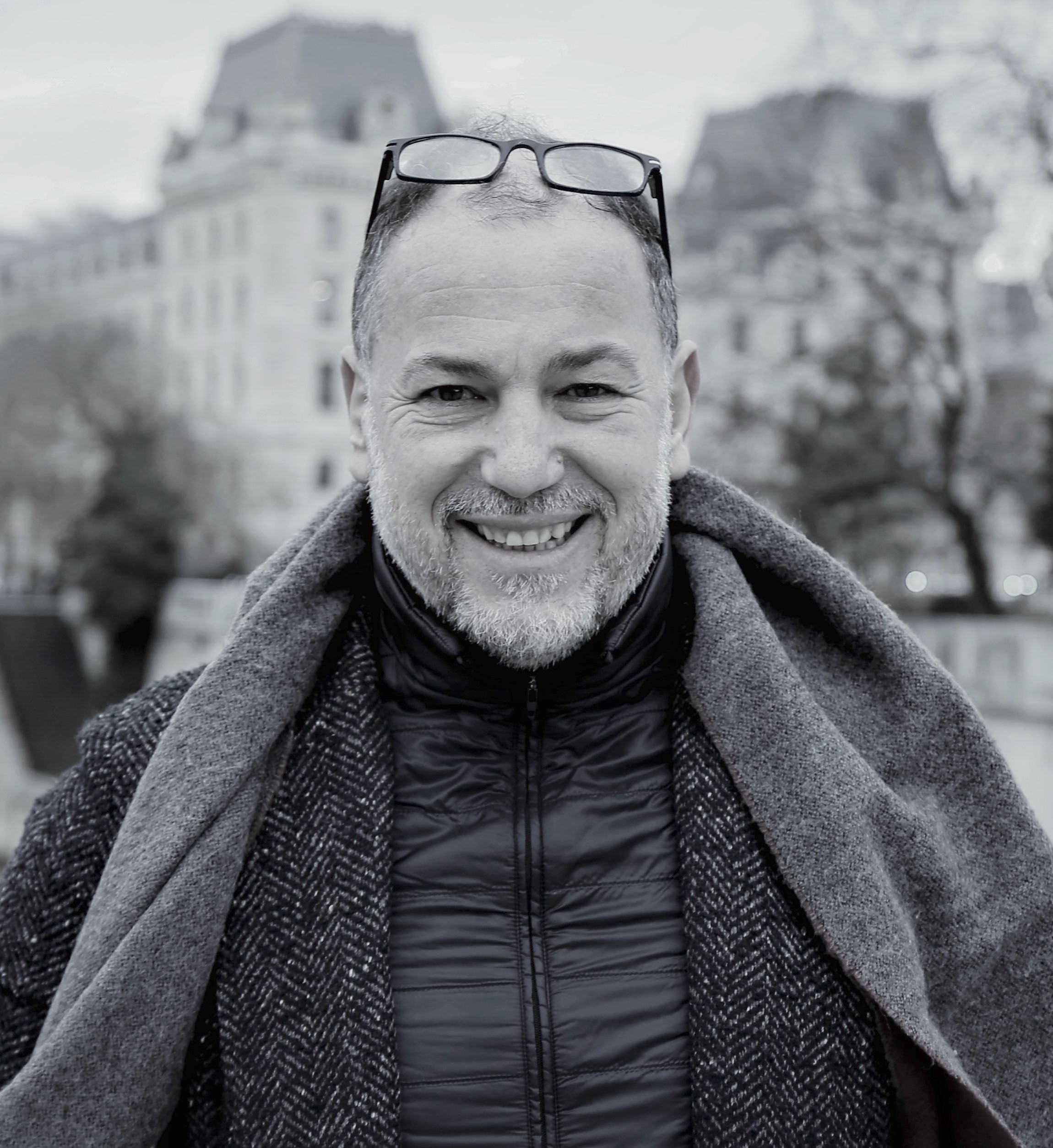
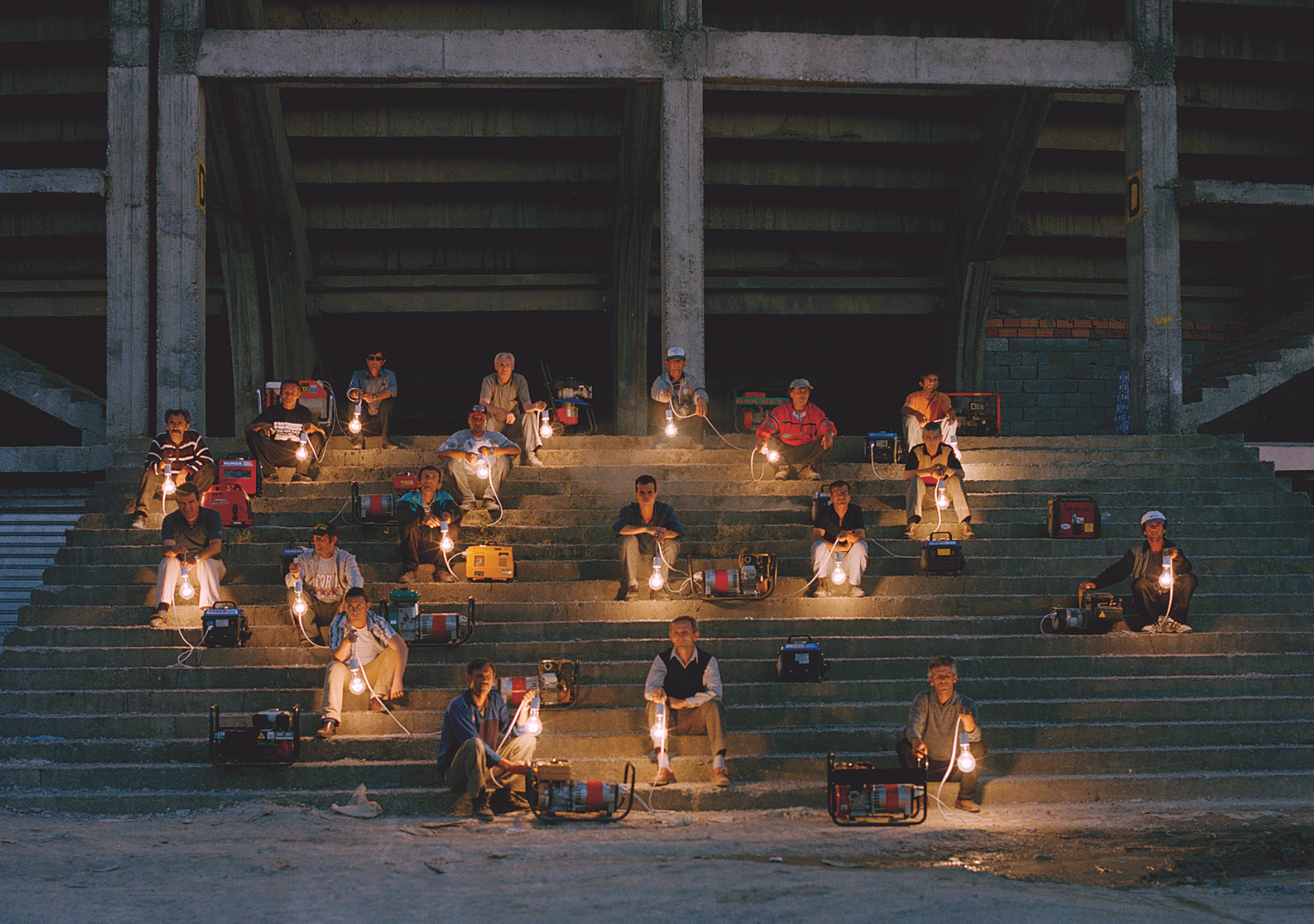
Turn On, 2004, video 3'33'' courtesy the artist Peter Kilchmann Gallery, Zurich, kaufmann repetto, Milano, New York
Jumana Manna
PalestineFebruary – March 2019
Jumana Manna is a Palestinian artist working primarily with film and sculpture. Her work explores how power is articulated through relationships, often focusing on the body and materiality in relation to narratives of state building, and histories of place. Manna received a BFA from the National Academy of Arts in Oslo and an MA in Aesthetics and Politics from California Institute of the Arts. She has participated in multiple festivals and exhibitions, including the Viennale International Film Festival, BAFICI, IFFR Rotterdam, Tate Modern, Marrakech Biennale 6 and The Nordic Pavilion, 57th Venice Biennale. Her 2015 documentary A Magical Substance Flows into Me (premiered in Berlinale Forum, 2016) won Films on Art Competition, at the New Horizons International Film Festival, Wroclaw.
Manna was awarded the A.M. Qattan Foundation’s Young Palestinian Artist Award in 2012, the Ars Viva Prize for Visual Arts and was nominated for the Preis der Nationalgalerie für junge Kunst in 2017.
Supported by the A. M. Qattan Foundation through the “Visual Arts: A Flourishing Field” project funded by Sweden.
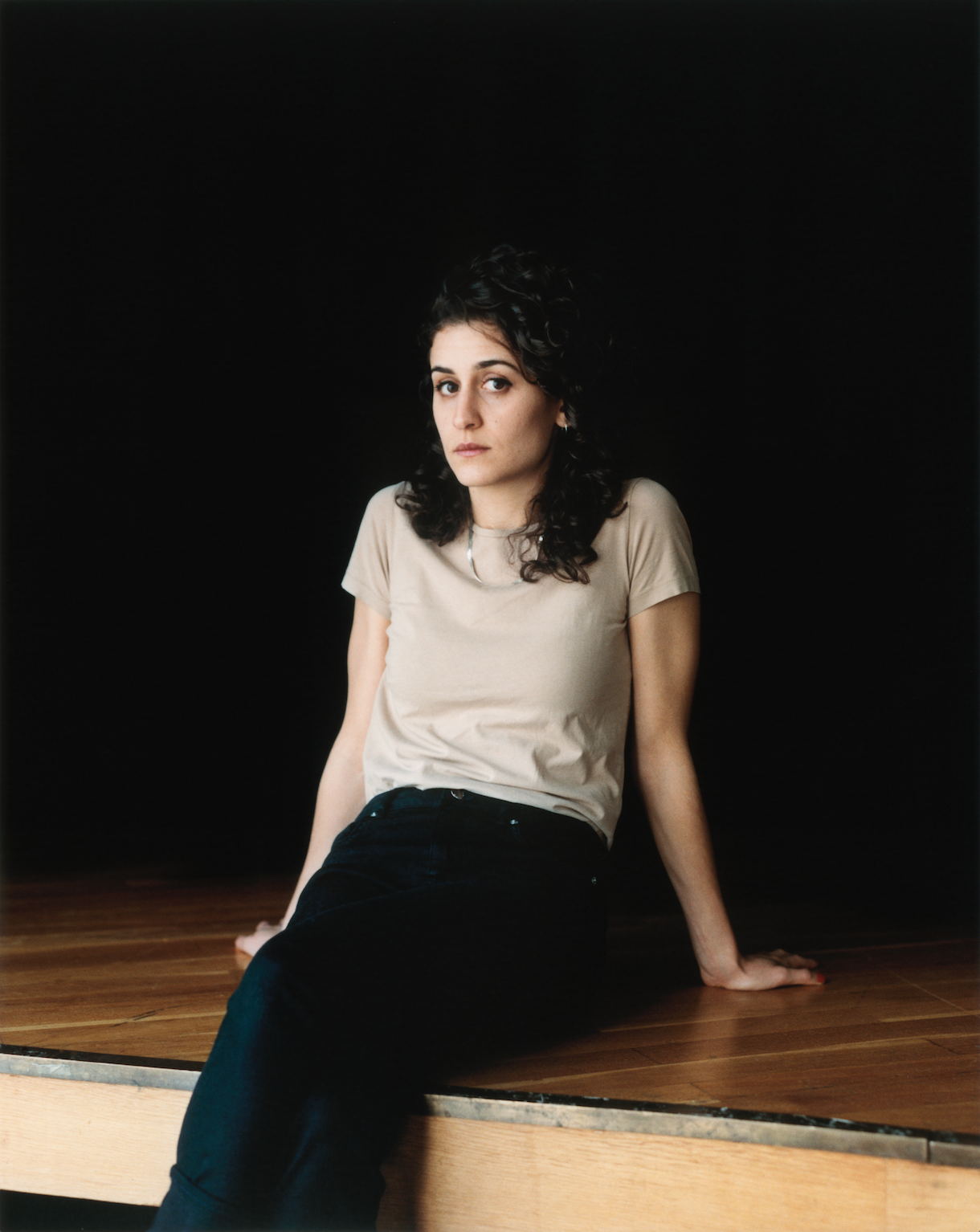
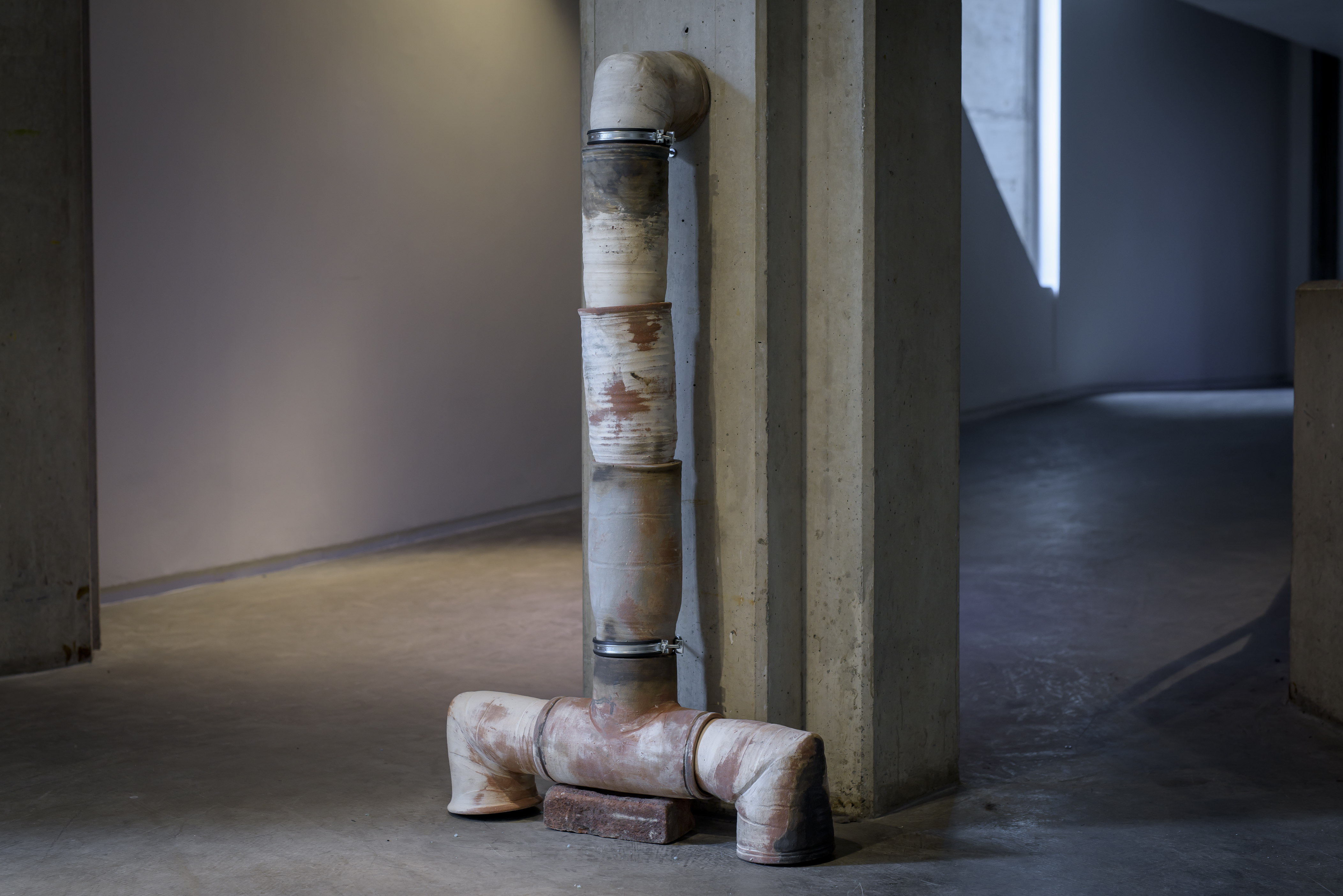
Mohammad Saleh
PalestineFebruary 2019 – on-going
Mohammed Saleh is a Permaculture designer, activist and educator who holds two degrees in both Psychology and Musicology. He has been working in the field of sustainability for about a decade. During his five-year stay in Turkey, Mohammed operated and managed an off-the-grid ecological educational center in the Iğde Mountains of Çanakkale which lit his passion for self-sufficient living. As soon as he came back to Palestine, he founded, Mostadam Eco Design, an eco social enterprise that provides ecological solutions through implementation, education, design, and consultancies tailored to fit the local culture, climate and challenges.
In the last years, Mostadam has brought innovative methods in greening the urban environment, bringing nature back to the city, and hearts of the people, using various techniques like vertical gardens, the Top Pot, small food forests, edible landscaping and Aquaponics (soil-less farming) both to schools and the private sector.
In 2016, Mostadam presented the art installation 'Yaleekom', which was commissioned by Qalandia International (QI) and Ramallah municipality, in which he demonstrated five models of self-sufficiency to the refugee camps context, all based on up-cycled gardens. Followed by the cooperative visual art project 'Refuge Garden' as part of QI 2018 on the mobile garden one finds a home and a refuge in. Lately, Mostadam has been leading, certified Permaculture courses, international projects and developing along with academicians the EcoPonics system.
For his Dar Jacir residency, Mostadam will be planting the seed of the first Urban Farm in Palestine, a case study that aims to address the concerns of the farmers we provide training to, as well as create a model of a financially viable farming operation which is free of harmful synthetic chemicals on a small piece of land in the middle of the city.
Supported by the A. M. Qattan Foundation through the “Visual Arts: A Flourishing Field” project funded by Sweden.
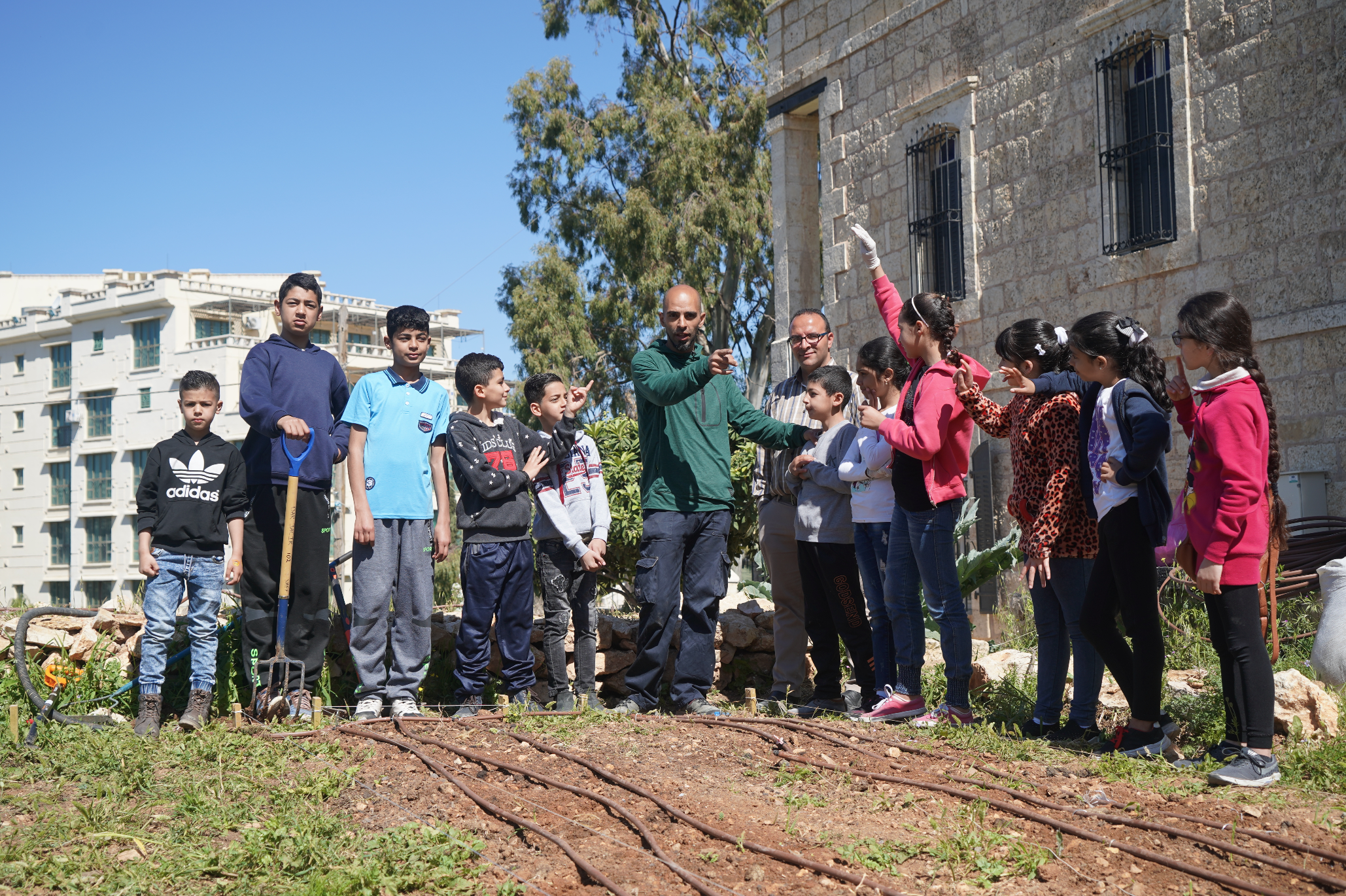
A Strong, Safe And Sound Structure
15’29”Chile
June 2019.
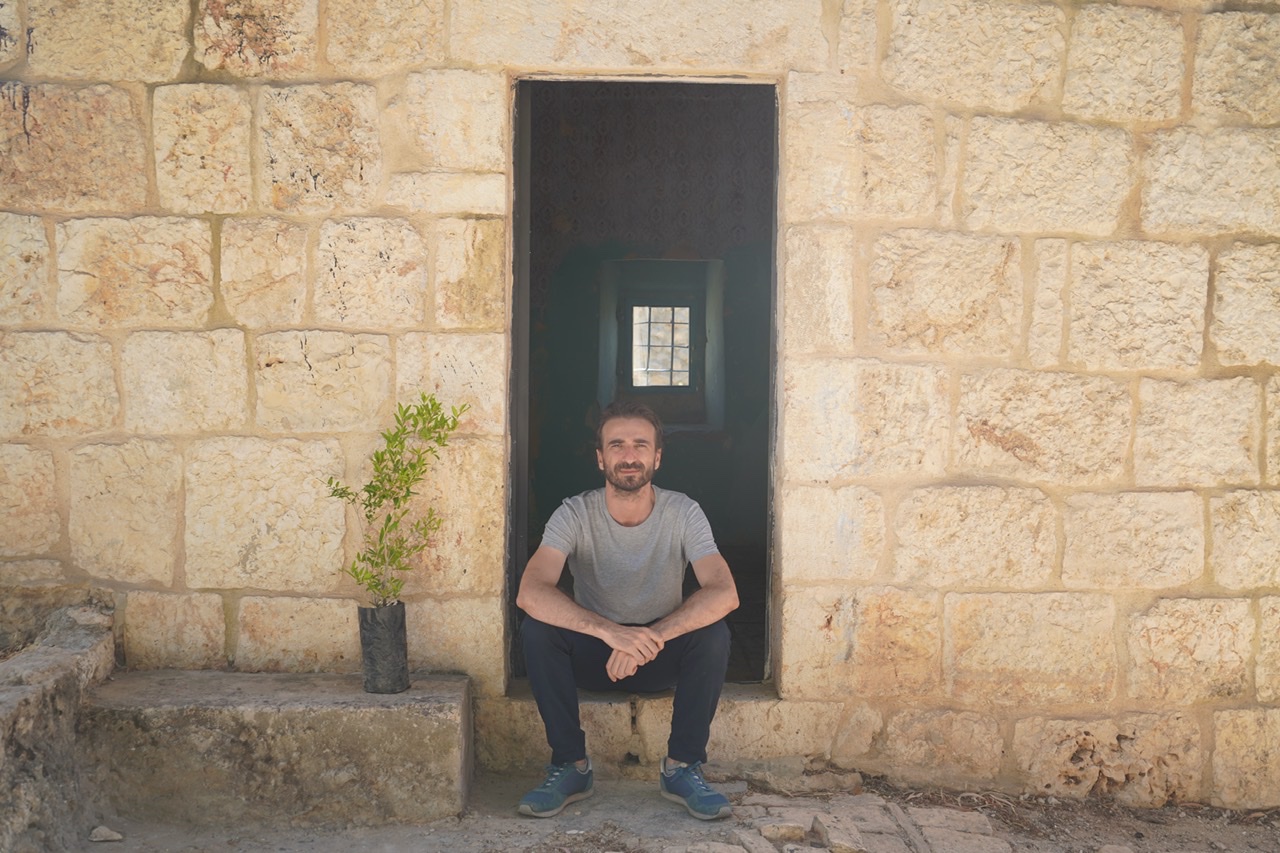
Photo: Emily Jacir 2019
Sebastián Rawicz residency at the Dar Jacir´s Sound Studio started with a question: how to transpose the experience of a space?
When he first entered the small square building made of stones in Dar Jacir´s garden, he perceived it as a sacred structure, a hiding place from which listening would be possible without being seen. A protected place for silence and contemplation. A place of geographical convergence, where the wind rose perfectly opens towards the four walls, creating a harmonical balance at its center.
Is the sacred aura of this space related to its past, to its previous disposal? To its location? To the events it witnessed?
In order to bring his experience back to Santiago, Sebastián decided to create a narrative of the Sound Studio building, tracing its coordinates through sounds and voice recordings. Listeners would have to follow his voice blindly, imagining running their fingers along the white stone walls, as the recorded sound slides on them, embracing the structure of this secret temple.
He investigated the history of the building, he measured it in width and height, counting its stones, observing layers of memories superimposing and coinciding on the walls, reconnecting the strings between different moments in time.
How to be fully present in a space, without understanding it deeply? How to connect with it, immerse in it, without following its historical path, without taking a look at the incertitude of its future?
Sebastián´s narration poses itself as an open invitation for future residents that may be willing to translate it to their own language, adding or subtracting from it according to their experience, transforming it, year after year, into a collective repository of perspectives.
The Sound Studio Residency is supported and curated by Nicolàs Jaar.
Sebastián Jatz Rawicz
Santiago, Chile.Composer, translator and bell ringer.
In 2008 he founded arsomnis (www.arsomnis.com) with which he has carried out large scale works such as John Cage’s Musicircus, Reunion and ASLSP, Vexations by Erik Satie and his own One Hundred Extended Geometrical Chords, among many others. He has made numerous sound interventions, both individual and collective, in public and institutional spaces both in Chile and abroad. His work uses diverse and experimental sound sources, intersecting timelessness, disciplines and reflections from literary, philosophical and even religious realms, with an autonomous and critical perspective. Simultaneity, an expanded notion of music over extended times and spaces, collectivity and metaphorical qualities, among others, are permanent axes of his proposal.
As a translator he has published books by Jan Fabre, John Cage, Joseph Kosuth, Celeste Olalquiaga and Kenneth Goldsmith, among several others.
He is a bell ringer and founder of Campaneros de Santiago.
-
Sebastián Jatz Rawicz
Santiago, Chile.Compositor, traductor y campanero.
En 2008 funda arsomnis (www.arsomnis.com) con la cual ha realizado proyectos de gran escala como Musicircus, Reunion y ASLSP de John Cage, Vexations de Erik Satie y su propia Cien Acordes Geométricos Extendidos, entre muchas más. Ha realizado numerosas intervenciones sonoras, tanto individuales como colectivas, en espacios públicos e institucionales, tanto en Chile como en el extranjero. Su obra utiliza diversas fuentes sonoras experimentales, intersectando atemporalidades, disciplinas y reflexiones provenientes de ámbitos literarios, filosóficos e incluso religiosos, con una perspectiva crítica y autónoma. La simultaneidad, una noción expandida de la música en espacios y tiempos extendidos, lo colectivo y lo metafórico, son ejes constantes en su propuesta.
Como traductor ha publicado libros de Jan fabre, John Cage, Joseph Kosuth, Celeste Olalquiaga y Kenneth Goldsmith, entre varios más.
Es campanero y miembro fundador de Campaneros de Santiago.
Rolando Hernández
MexicoAugust 2019
Rolando Hernández’s practice takes different tools from archive research, curatorship, writing, composition and art production. Since 2013 he is co-director and curator of Umbral, a project space and festival gathering practices interested in sound experimentation. Since 2015 he runs the artistic institution CCADDASM (Centro de Creación Archivo y Difusión de Documentos de Arte Sonoro en México) which has created different projects to create an alternate historiography of sound practices in Mexico. As a composer, his work Topializ was studied for the PHD thesis “Componer la duración de la experiencia musical” from Santiago Astaburuaga and published by Marginal Frequency. He has been awarded with the first latinoamerican residency Tsonami Arte Sonoro/Casaplan for his criticised project Basuraleza Muerta Viva. Also he received a merit shcolarship to assist to the Curatorial Intensice of ICI (Independent Curators International ) in Alumnos47 (MX City) His work has been published and presented at places , presses and labels like : Gauss PDF, Caduc, Theme Park for Ear, Impulsive Habitat, Tsonami Arte Sonoro, Festival CuatroXCuatro, Labor Sonor,FotoPhono, Fonoteca Nacional, Cha`ak`abb Paaxil/Multiple Tap, among others.
During his residency he worked on Exomológesis: A History About Contrition.
Supported by Nicolàs Jaar.
Exomológesis : A History About Contrition
This artistic research takes as point of interest the rituals used as contrition before the confession as we know it existed. One of them, exomológesis, was a life ritual of redemption. Everyday fasting, the use if certain places to sit in public spaces, to wear the same clothes until they're totally unusable were just one of the things u should do as part of this ritual alongside with flagellations, and prayers. One wouldn't talk about it's sins, it was rather a performative ritual that would talk for itself. My time at the studio at Dar Yusuf Nasri Jacir for Art and Research was to develop a work in which one would hear the whole process of Exomologesis in a way you would hear a confession. I created different body rituals that would recreate that atmosphere as well as the use of different references to confession like Thomas of Kempis and St. Augustine and prayers of contrition. The use of sound as material was to strength the idea of being in a reclusive state. A performative state to be listened to. It was a great opportunity to start to create other ways in which sound can extend it's potentials to talk about other histories as well as to think in other contexts for exhibition. I don't see this as music for a musical time. It is rather a music that needs a contextual space to be in time. This aims to be presented as a dramatized exhibition with the same title in the following year. It will include the creation of more works including photographies, ritual objects and two durational performances.

October 10th through October 28th 2019
Rashed A. is a Palestinian-Jordanian writer living in London. He’s been published in The Cardiff Review and Smith Journal. He is the co-founder of LIFTA, a studio and small press based between Mexico City and the Middle East. Rashed was an artist-in-residence at Dar Jacir in the Fall of 2019. He has been shortlisted for the 2020 Fitzcarraldo Essay Prize and his short story Next Week was long-listed for the Desperate Literature prize. He is currently writing his first novel.
As part of his residency at Dar Jacir, Rashed A. worked on a novel based on his mother’s family history. During this emotional first visit/return to Palestine, Rashed also used his time to explore the landscape, the locations, and to conduct interviews for his work. Rashed is working on a series of essays that center around different themes including issues of memory, violence, displacement, abjection, absence, writing, liminality. The essays are part of a project that looks at the ways we work and write through, or rather, within, absence.
The essay that Rashed wrote about his time in Palestine, Nothing For You, was performed and read online as part of our online public program. It is a meditation on rupture and the violence of return, but also the cliché of it, what it feels to experience something that has been written about and mythologized for oneself and making sense of it in the granular sense: the embodiment. The essay was shortlisted for the Disquiet Prize and is the basis of a larger work he’s writing, slated to be published at the beginning of 2021.


Palestine
September 23 through October 8th 2019
Born in Dubai, Mahdi Fleifel lives and works between Denmark, England and Greece. A graduate of the UK’s National Film & Television School, he studied Fiction Directing under Stephen Frears and Pawel Pawlikowski. In 2010 he founded the London based production company Nakba FilmWorks with Irish producer Patrick Campbell. Fleifel’s critically acclaimed debut feature, A WORLD NOT OURS, premiered at the Toronto International Film Festival and received over 30 awards, including the Berlinale Peace Prize, and the Edinburgh, Yamagata and DOC:NYC Grand Jury Prizes. He was named Best New Nordic Voice at Nordisk Panorama, and received the New Talent Award at CPH:DOX in 2013. In 2016 Fleifel won a Silver Bear for A MAN RETURNED. His follow up, A DROWNING MAN, was selected in the Official Competition at Cannes, and was nominated for a BAFTA. His last film, I SIGNED THE PETITION, won Best Documentary Short at IDFA and was nominated for the 2018 European Film Awards.
During Mahdi’s residency at Dar Jacir in the Fall of 2019, he conducted casting sessions, met various colleagues and potential local partners and crew in Bethlehem. He also began working on an idea for a short film with young filmmakers from Deheisha.
Mahdi Fleifel’s film “A Man Returned” was screened as part of our online public program in response to COVID-19 in April 2020. The film won the Silver Bear at Berlinale in 2016.

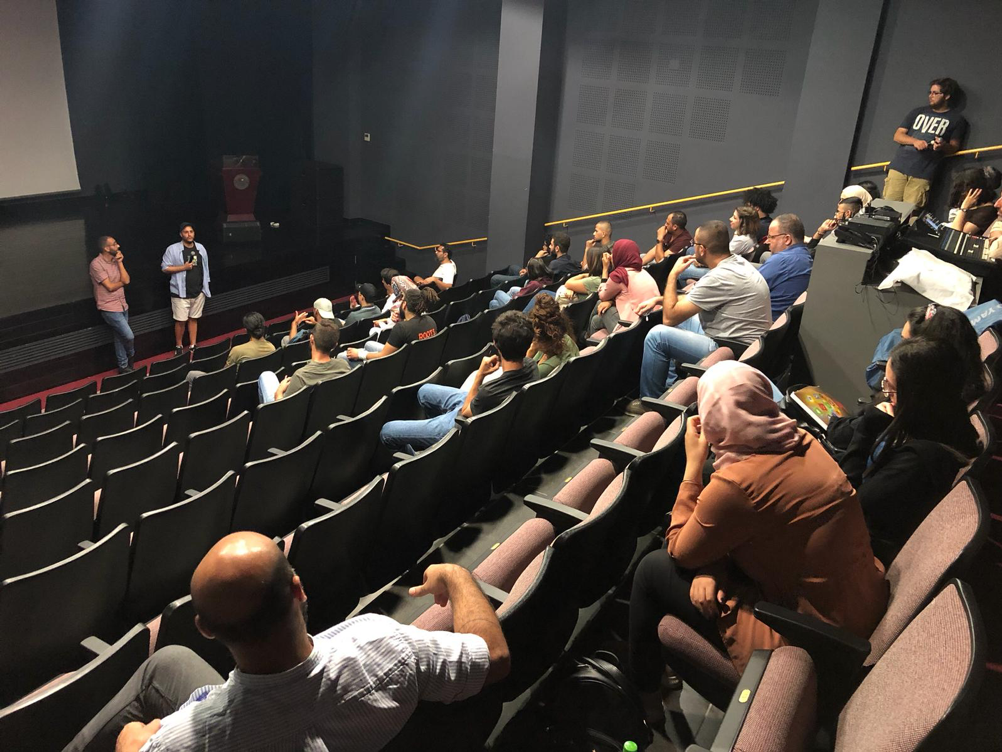
Shuruq Harb
PalestineHosted by Aline Khoury
15 April – 20 May, 2021
Shuruq Harb is an artist, filmmaker and writer. She is the co-founder of several independent art initiatives such as ArtTerritories (2010-2017) and The River Has Two Banks (2012-2017). Her artistic practice focuses on online visual culture and traces subversive routes for the circulation of images and goods. Her film The White Elephant received the award for best short film at Cinema du Reel Festival in Paris, 2018, and was shortlisted for the Hamburg International Short Film Festival, 2019. Most recently she published her first short story “ and this is the object that I found ” (2020) at Mezosfera. Her solo exhibition at Beirut Art Center brings together for the first time several of her artworks in one exhibition. She is the recipient of the Han Nefkens Foundation – Fundació Antoni Tàpies Video Art Production Award (2019).
Ghost at the Feast
Welcome to this feast.
What is on the menu is a beast.
I write to you from Beit Jala, Bethlehem, where every day I wake to the sounds of the construction of the Israeli segregation wall. An uninterrupted sound drowned during the day by the laughter of children playing in the neighborhood, and the excessive honking of our road rage.
I tell myself I need to meditate to this sound. To keep hearing it. To remain conscious of it. To not let myself forget it as I try to go on my day. To not let it recede to the background.
I came here to this city to work on this exhibition. To carve out some distance from my own city, Ramallah, in order to communicate with you who are in Beirut.
When I say it that way, I realize the absurdity of it all.
Escape the fragility of one city by soaking in the vulnerability of another.
Most of these works have emerged from a restless effort on my part, over the last ten years, to come to a reckoning with my city, its changing urban topography, its status and symbolism. I would like to think I have created a portrait of my city through its ephemeral indexes –the everchanging nature of street signs and popular cultural imagery that find their way onto the facades of the city and into its virtual clouds.
I looked at names of people on street signage, faces adorning billboards and storefronts –they are images, names and signifiers of other places. The memories of others have become my way of claiming my own recollection of this place. Sometimes this appropriation reveals what is concealed, other times it expresses a disorientation.
It would be a mistake to confuse the place with the symbol.
I suppose that is particularly true of Palestine, the place and the symbol. The Israeli occupation has fragmented the landscape, reducing Palestine to a symbol, an idea, rather than a continuous reality or coherent body.
To accept fragmentation is to accept occupation. To accept that now every city, town, street, neighborhood has a distinct visual presence in which the occupation exercises its power, resulting in distinct mental and psychological symptoms.
In the mid 2000s, we started to refer to Ramallah as a ‘syndrome’. I remember how uncomfortable this made me feel because it implied a unique numbness to and disconnection from the rest of Palestine. As if Ramallah was some remote Island, a de facto capital of the Palestinian Authority. We can have Ramallah if we give up Jerusalem. As I make this exhibition, I have tried to think about this discomfort with more nuance.
It took me ten years to realize that the numbness of Ramallah is also part of the bigger picture of the occupation in Palestine. I am sad that my city is not so heroic, it is doozy and confusing. I realize now that Ramallah also needs to be re-claimed, to reject Ramallah is to accept that the Israelis have succeeded.
By looking at the pavements, the peripheral, I was trying to remind the city of its actual streets. I wanted a chance to dance amongst its ghosts, which have refused to bow down and move on, these ghosts who have triumphed over death.
When a symbol is emptied of meaning, it becomes a ghost; a reference to that which has been lost; a stubborn trace of what has been condemned to be made invisible. It is a comforting kind of melancholia to realize that you have been invited to a feast amongst these ghosts.
Relentless auras trying to speak of that which has been lost, a summoning to recognize their potential to be re-invoked.
But there is no magic, nothing can code the contradictions of reality. Here everything is stripped to its basics, a mirror to see beyond that which is already known, an acknowledgment that these familiar symbols are nothing if not spectral.
Ghost at the Feast was produced by Beirut Art Center with additional support from Al- Harah Theater and Dar Jacir for Art and Research.
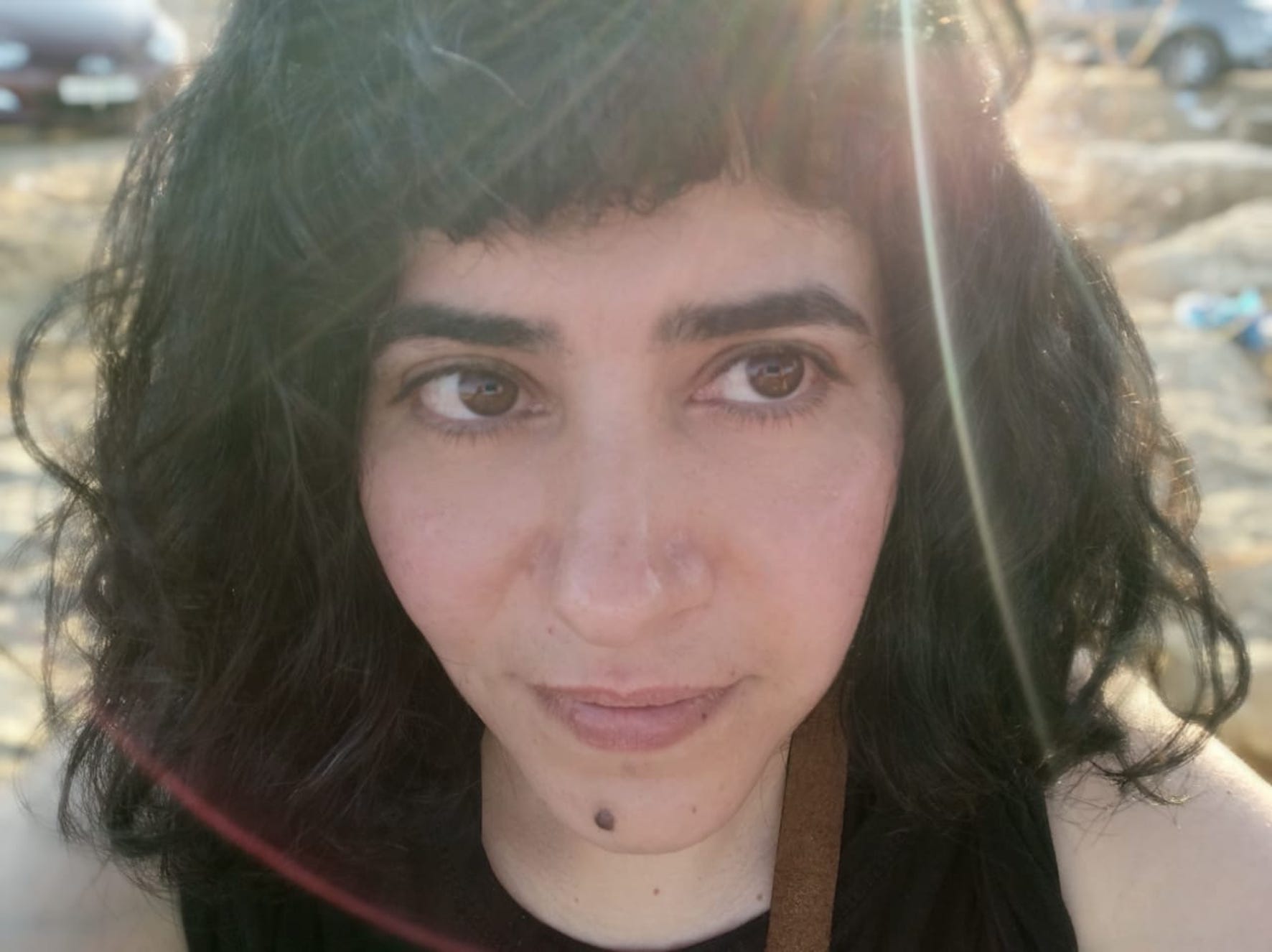
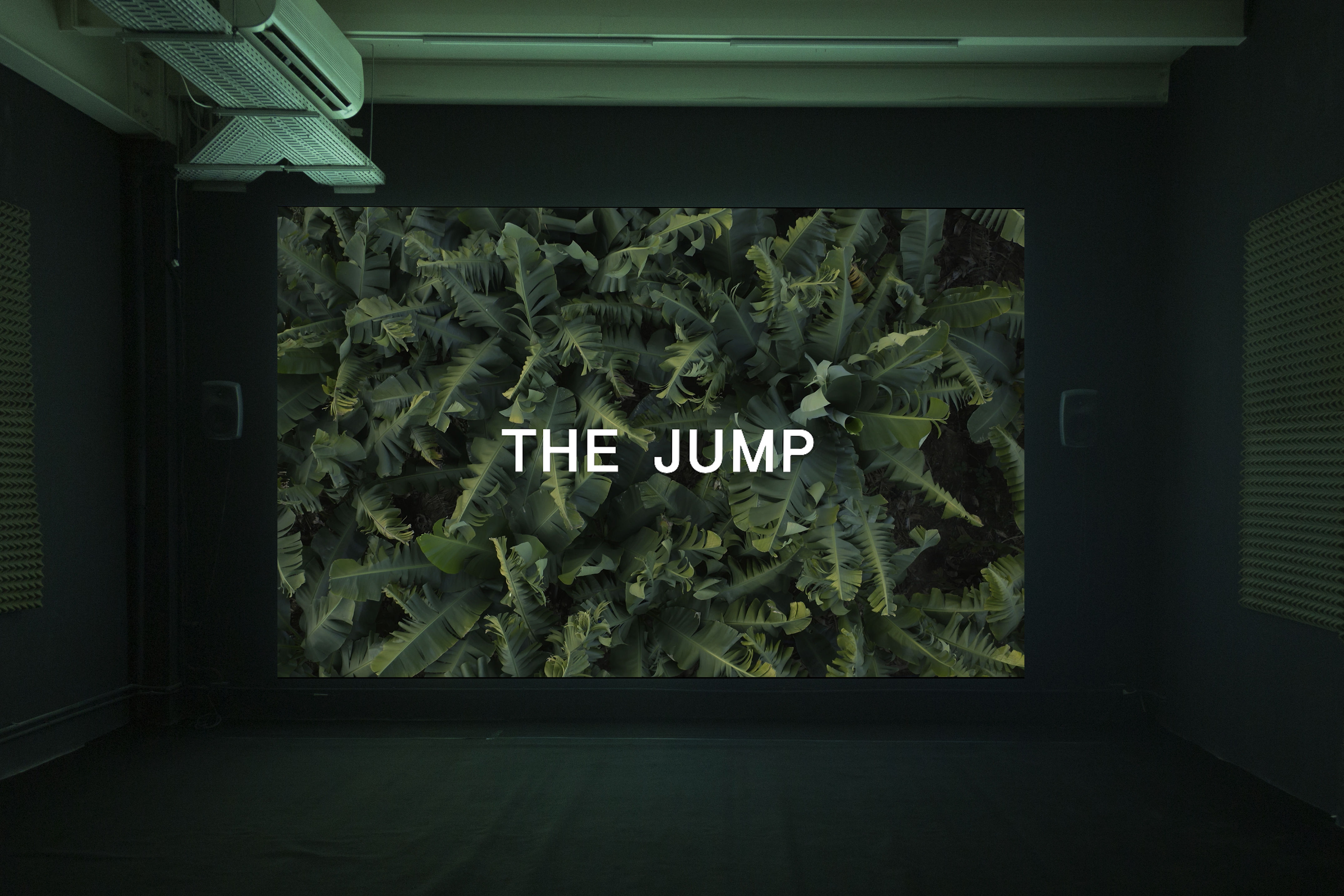
Palestine
Hosted by Emily Jacir
March - May, 2020
Firas Mukarker is a filmmaker from Beit Jala, born in Jerusalem 1984, and currentlybased between Palestine and Sweden. He began his career in photography in 2009,winning several local and international prizes for his still photography. In 2014 hemoved to Sweden where he shifted his focus towards filmmaking and movingimages. He went to film school in Gothenburg (2018) and studied fiction anddocumentary filmmaking. THE OTHER SIDE is his first short documentary film and itwon several prizes in Scandinavia. At Dar Jacir he worked on a documentary filmabout feminist movements in Palestine but due to the pandemic started working onanother film project - the inside story of the Angel hotel where the first coronaviruscases in Palestine took place. He filmed 40 days of exclusive material and footage atthe Angel Hotel during this period and has begun post-production.


Palestine
Hosted by Annemarie Jacir
10 January - 26 February, 2020
Majdi El-Omari received (BFA) in filmmaking from the Cairo Institute of Cinema in Egypt, and (MFA) in Film Production from Concordia University, in Montreal, Canada. After working in the Middle East as an assistant director and production manager on various feature and documentary films, El-Omari became a filmmaker, scriptwriter, producer and editor. El-Omari’s short films d’auteur have been selected in several international festivals. Standstill was his debut feature film. El-Omari lives in between Haifa and Montreal now is writing his next feature film “The Woman of the Bees” while teaching fiction filmmaking in Dar al-Kalima University in Bethlehem.

SOUTH WEST BANK - Landworks, Collective Action and Sound
Collateral Event of the 60th International Art Exhibition of La Biennale di Venezia.SOUTH WEST BANK - Landworks, Collective Action and Sound is an exhibition which focuses on works produced by artists, collectives and allies in and around the southern West Bank in Palestine. Organized by Artists + Allies x Hebron and presented in collaboration with Dar Jacir for Art and Research in Bethlehem, curated by Jonathan Turner. Selected as a Collateral Event of the 60th International Art Exhibition of La Biennale di Venezia.
The participating artists look at aspects of land, agriculture and heritage in a rapidly ever-shifting topography. The artists share a voice centered on historical transmissions of memory and collectivity. The works embody the idea that ‘home’ is strongly rooted in many traditional practices, a reinforcement of the Stranieri Ovunque – Foreigners Everywhere theme of the Biennale Arte 2024 as proposed by its artistic director Adriano Pedrosa.
The works further strengthen the connection of expressions and cultural identities within changing urban and agricultural landscapes. They communicate farming practices, indigenous growing and gathering methods, and the practices of human and non-human rhythms as a sensory resistance. The exhibition highlights sound narratives manifesting the symbiosis between vegetation and nature.
"The intent is to look at process-based artistic practice being produced by Palestinian artists and allies in the southern West Bank, an area which is often culturally over-looked," according to curator Jonathan Turner. "Our exhibition is particularly focused on collectives and a multi-faceted approach, from photographs and videos documenting aspects of daily life and resilience against a background of conflict, to performance projects which find their voice as they develop. It plots change over time in a shifting landscape. The artworks, publications, moving images, soundworks and sculptures clearly reveal the strength and value of inventiveness, propositive thought and open research in the current climate."
The exhibition includes photographs, installations, archival images and videos from several land projects initiated by artists; the works from a seed conservation initiative, a permaculture designer and educator, documentation of rural life and practices, the cultivation, neglect and destruction of traditional olive groves, and discussions of biodiversity and heirloom varieties. It also focuses on literary writing and documentation, dance as a form of collective making inspired by elements directly connected with agriculture and working the land, and other works that place a strong emphasis on sound-making.
Central to the work of the artists presented by Dar Jacir for Art and Research are dance, planting, music and rhythm as a form of poetry, resistance and sustenance.
“The works produced at Dar Jacir reflect the transgenerational nature of our practice and the interdisciplinary connections between us all. Through our space conversations unfold across many years and we insist on maintaining the global interconnectedness that has always been part of the history of Bethlehem. For the past 10 years at Dar Jacir we have fostered in depth relationships and exchanges with Chile, southern Italy and Ireland. Also our insistence of our belonging to the Mediterranean is an integral aspect to the works.” - Emily Jacir, Founding Director.
Meanwhile, Artists + Allies x Hebron aims to draw the attention of the international community to the situation in Hebron H2, where Israel exercises military control to monitor every aspect of Palestinian life throughout the West Bank. It focuses on engagement to gain a genuine and firsthand understanding of the situation on the ground.
“All the work presented here was made in a very specific part of the world. The works focus on what should ordinarily be objects, movements and sounds of abundance, joy and collectivity. In this context however, they all acquire a new sense of urgency. A photograph of an olive tree, more than 4,500 years old, which has remained untouched for centuries, suddenly feels so precarious. The hope lies in the collective spirit of how the individual works were made and how the exhibition has evolved." - Adam Broomberg co-founder of Artists + Allies x Hebron.
The works featured in the exhibition express an Anthropocene rooted in forced dispossession and occupation. The exhibition includes works from Samer Barbari, Adam Broomberg, Duncan Campbell, Andrea De Siena, Rafael González, Isabella Hammad, Shayma Hammad, Baha Hilo, Emily Jacir, Sebastián Jatz Rawicz, Sari Khoury, Benjamin Lind, Jumana Manna, Jasbir Puar, Michael Rakowitz, Adam Rouhana, Mohammad Saleh, Vivien Sansour, and Dima Srouji. In addition, participants from the Researching Palestine Zine led by Chris Harding includes Areej Ashhab, Raghad Hilal, Ramzi Nimr, Hanna Salmon, Laura Tibi and Marta Wodz.
We are honored to share the names of all the people from the Dar Jacir community who participated and contributed to the works featured in the Venice Biennale.
Luca Rossi, Firas Harb, Tamara Odeh, Nakhleh Sarras, Saif Hammash, Laura Esposito, Shahd Awawdeh, Motasem Abo Shera, Momen Alqrby, Rebecca Kaoud, Manar Raje, Ali Khalid Obeid, Bakr Qaraqe, Lourian Ghnaim, Tamara Odeh, Elissa Mitwasi, Sandra Istefan, Lama Altakruri, Nurin Shaden Kaoud, Baha’ Abu Shanab, Aline Khoury, Ludovica Morleo, Fabrizio Piepoli, Vincenzo Gagliani, Laith Hammad, Mustafa Hammad, Omar Zboun, Ghadeer Odeh, Basel Ikhmaies, Nadia Sarras, Dima Awad, Tareq Abu Salameh, Ossama Bawardi, Sylvia Truini, Iyad Sharea’, Juma Al Dabank, Lina Bani Odeh, Ala’ Abed, Nicolas Jaar, Joudeh Facouseh, Mahmoud Hafi, Majd Aburaya, Maram Nazzal, Motasem Siam, Rami Fararjeh, Ranin Faidi, Reem Khatib, Sajida Saraheen, Sama Abu Hamdieh, Samed Alhajajla, Yasmine Omari, Yazan Yaqoub, Philokalia Wines, Aida Youth Group, Baladi Center, Al Rowwad, Meat Studio.
Address:
Magazzino Gallery, Palazzo Polignac 878 Dorsoduro, Venice
Magazzino Gallery, Palazzo Polignac 878 Dorsoduro, Venice
Opening:
April 17-19: Open to the press
April 19: Private view
April 20 - November 24: Open to the public
Summer opening hours (from April 20 to September 30):
Wed-Mon: 11am - 7pm. Tue: Closed.
(from October 1 to November 24):
Wed-Mon: 10am - 6pm. Tue: Closed.
![]()
![]()
April 17-19: Open to the press
April 19: Private view
April 20 - November 24: Open to the public
Summer opening hours (from April 20 to September 30):
Wed-Mon: 11am - 7pm. Tue: Closed.
(from October 1 to November 24):
Wed-Mon: 10am - 6pm. Tue: Closed.
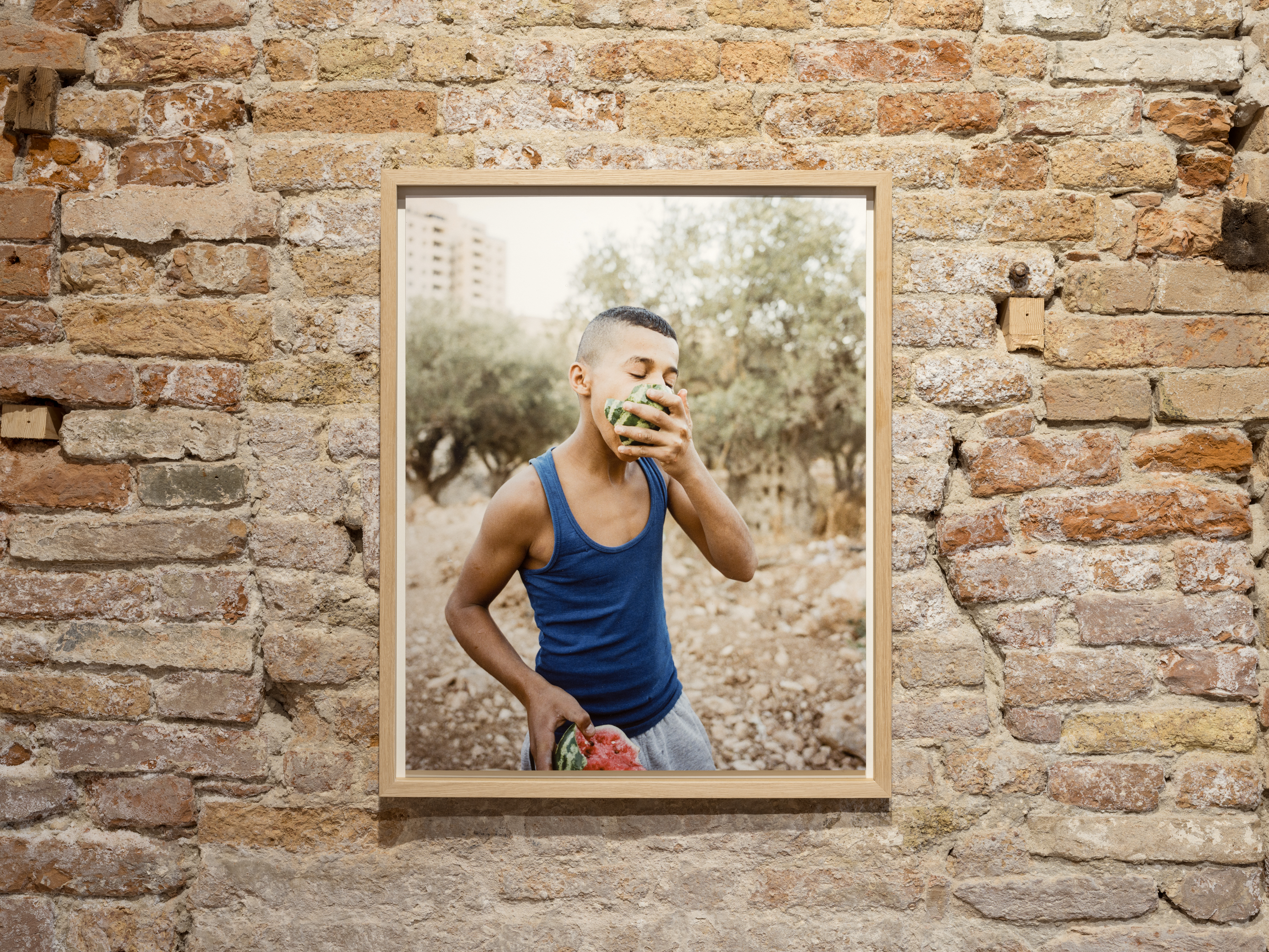

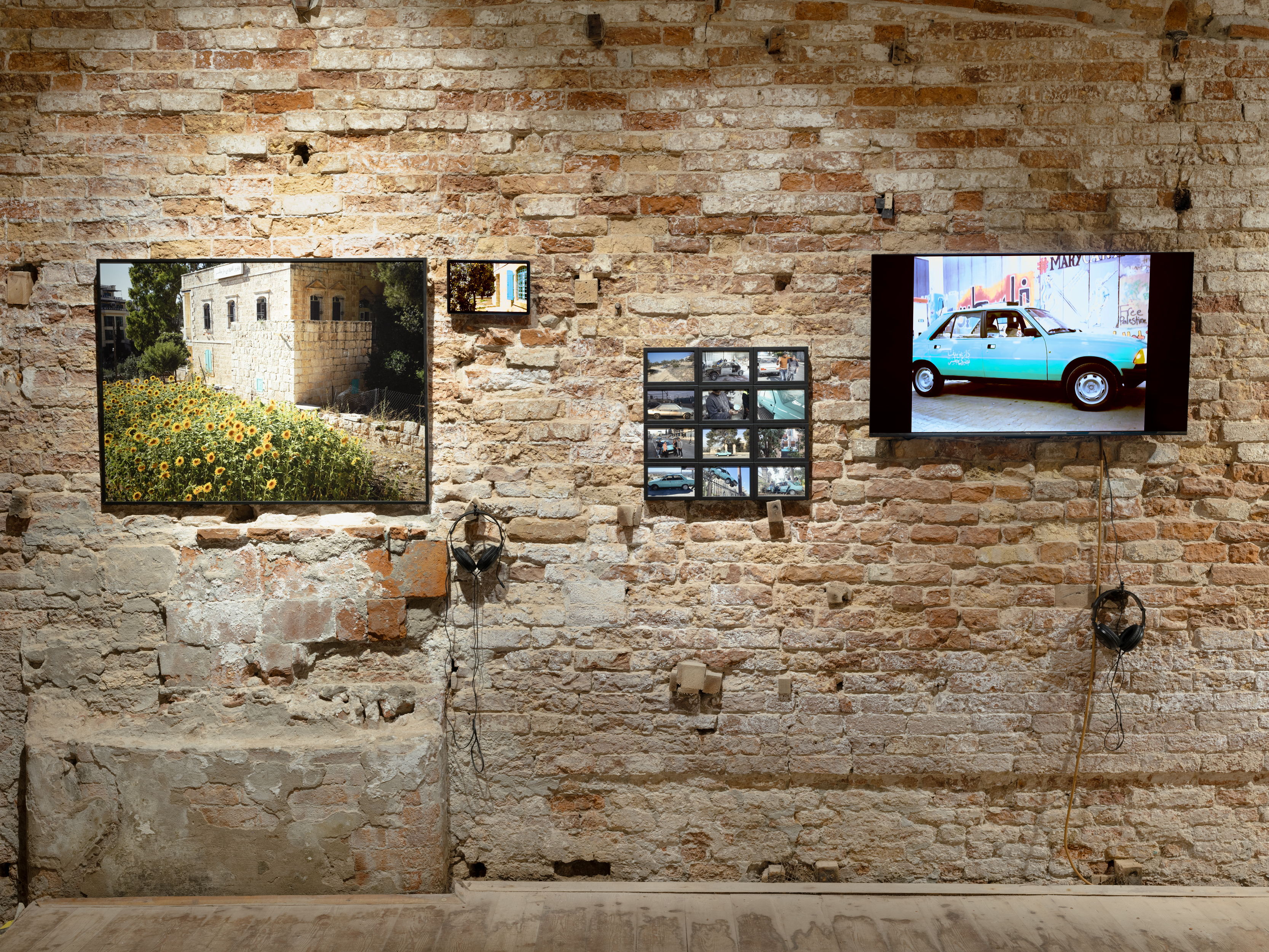

Foragers
Jumana MannaPalestine Cinema Days
November 5, 2022, 18:00
Foragers, directed by Jumana Manna
63 minutes, 2022 (Palestine)
Arabic/Hebrew with English subtitles
Foragers depicts the dramas around the practice of foraging for wild edible plants in Palestine/Israel with wry humour and a meditative pace. Shot in the Golan Heights, the Galilee, and Jerusalem, Manna employs fictional scenes and documentary and archival footage to portray the impact of Israeli nature protection laws on these customs. The restrictions prohibit the collection of ‘akkoub and za‘atar and have resulted in fines and trials for hundreds caught collecting these native plants. For Palestinians, these laws constitute an ecological veil for legislation that further alienates them from their land while Israeli state representatives insist on their scientific expertise and duty to protect. Following the plants from the wild to the kitchen, from the chases between the foragers and the nature patrollers to courtroom defenses, Foragers captures the necessity and pleasure of food traditions alongside their resilience to the prohibitive law. By reframing the terms and constraints of preservation, the film captures the effects of settler colonialism on land and cultural practices, as well as the politics of extinction debates that determine what gets preserved and who gets to decide.
Jumana Manna is a visual artist and filmmaker. Her work in film and sculpture explores how power is articulated through relationships, often focusing on the body, land, and materiality in relation to colonial inheritances and histories of place. She has participated in multiple film festivals including the Berlinale, Viennale, BAFICI, IFFR, Cairo Cinema Days, Goteborg Film Festival, Ambulante, Cinéma du Réel, and Art of the Real. Her Wild Relatives (2018) won CPH:DOX’s New Visions Award, Sheffield Doc’s Environmental Film Award, DokuFest Kosovo’s Green Dox Award, and Palestine Cinema Days’ Sunbird Award. Jumana was raised in Jerusalem and lives in Berlin.
Part of Palestine Cinema Days 2022 organized by Filmlab:Palestine
Memory Box
Joana Hadjithomas and Khalil JoreigePalestine Cinema Days
November 4, 2022, 18:00
Memory Box, directed by Joana Hadjithomas and Khalil Joreige
102 minutes, 2021(Lebanon/ France/ Canada)
Arabic/ French with Arabic and English subtitles
Maia, a single mother, lives in Montreal with her teenage daughter, Alex. On Christmas Eve, they receive an unexpected delivery: notebooks, tapes, and photos that Maia sent to her best friend from 1980’s Beirut. Maia refuses to open the box or confront its memories, but Alex secretly begins diving into it. Between fantasy and reality, Alex enters the world of her mother’s tumultuous, passionate adolescence during the Lebanese civil war, unlocking mysteries of a hidden past.
The work of filmmakers/artists Joana Hadjithomas & Khalil Joreige interrogates the creation of images and representation, from the construction of the imaginary to the writing of contemporary history. They are interested in traces of the invisible, the absent and stories kept from view; such as the missing victims the Lebanese civil war, a forgotten space program, geological and archaeological strata, or the strange consequences of Internet scams and spam. Their feature films The Lebanese Rocket Society, A Perfect Day and Je Veux Voir (featuring Catherine Deneuve and Rabih Mroué) have been screened and awarded in major international festivals, and their artworks exhibited in prominent museums, biennales and art centers worldwide. In 2017, they were awarded the prestigious Marcel Duchamp Prize. Hadjithomas and Joreige are the co-founders of Abbout Productions and serve as executive board members of the Metropolis Cinema in Beirut.
Part of Palestine Cinema Days 2022 organized by Filmlab:Palestine
Daughters of Abdulrahman
Zaid Abu HamdanPalestine Cinema Days
November 4, 2022, 20:00
Daughters of Abdulrahman, directed by Zaid Abu Hamdan
118 minutes, 2021 (Jordan)
Arabic with English Subtitles
Zainab wakes up to a shocking discovery that could defame her in the neighborhood. She quickly calls for her sisters’ aid. Yet fiery Amaal has her own secret struggle and will not deal with Samah who is too busy with her own issues. Meanwhile Khitam tries to focus on her own mission.
Born and raised in Amman, Jordan, Zaid Abu Hamdan holds an MFA from the New York Film Academy in Hollywood California. Zaid started his career working on international TV shows as an Assistant Director and Producer, including E! Entertainment’s coverage of the Golden Globe and Sesame Street. In addition, Zaid worked as a television reporter for Middle East Broadcast Corporation group (MBC Group) in Hollywood. He also worked on directing reality and scripted shows such as Sesame Street, a competition that shows and mentors the Arab Film Studio program at Image Nation, Abu Dhabi. Since 2009, Zaid has written and directed five award winning and audience acclaimed short films, including Bahiya & Mahmoud, which was the official Jordanian submission to the Academy Awards in 2012.
Part of Palestine Cinema Days 2022 organized by Filmlab:Palestine
Mariner of the Mountain
Karim AïnouzNovember 3, 2022, 18:00
Palestine Cinema Days
Mariner of the Mountain, directed by Karim Aïnouz
95 minutes, 2021 (France, Brazil, Germany, Algera)
French, Arabic (Algerian Dialect), Portuguese, and Tamashek with Arabic Subtitles
Filmmaker Karim Aïnouz decides to take a boat, cross the Mediterranean, and embark on his first journey to Algeria. Accompanied by the memory of his mother, Iracema, and his camera, Aïnouz gives a detailed account of the journey to his father’s homeland, interweaving present, past, and future.
Karim Aïnouz is an award-winning film director and screenwriter. He was born in 1966 in Brazil to a Brazilian mother and an Algerian father. Aïnouz debuted as feature director with Madame Satã (Cannes, Un Certain Regard, 2002). Other works include Nardjes A. (Berlin Panorama, 2020), Central Airport THF (Berlin Amnesty Prize, 2018), Futuro Beach (Berlin Competition, 2014), The Silver Cliff (Cannes Directors’ Fortnight, 2011), and Love for Sale (Venice Horizons, 2006). In 2008, Aïnouz co-directed the TV series Alice for HBO Latin America. His latest feature, The Invisible Life premiered in Cannes’ Un Certain Regard in May 2019, where it received the Main Award and more than 50 prizes worldwide. Aïnouz is also a member of the Academy of Motion Pictures Arts and Sciences.
Part of Palestine Cinema Days 2022 organized by Filmlab:Palestine
Master Class
Coco Fusco2 April – 11 April, 2020
A master class for practicing visual artists to discuss their current works in progress with Coco Fusco. The masterclass includes one on one sessions with the artists as well as a group meeting and exchanges.
Coco Fusco is an interdisciplinary artist and writer. She is a recipient of a 2018 Rabkin Prize for Art Criticism, a 2016 Greenfield Prize, a 2014 Cintas Fellowship, a 2013 Guggenheim Fellowship, a 2013 Absolut Art Writing Award, a 2013 Fulbright Fellowship, a 2012 US Artists Fellowship and a 2003 Herb Alpert Award in the Arts. Fusco's performances and videos have been presented in the 56th Venice Biennale, Frieze Special Projects, Basel Unlimited, two Whitney Biennials (2008 and 1993), BAM’s Next Wave Festival, the Berlinale, Mercosul and other biennials in Liverpool, Sydney, Johannesburg, Shanghai and Kwangu. She is represented by Alexander Gray Associates in New York. She is a professor at The Cooper Union School of Art.
Fusco is the author of Dangerous Moves: Performance and Politics in Cuba was issued by Tate Publications in 2015, and a Spanish translation was published by Turner Libros in 2017. She is also the author of English is Broken Here: Notes on Cultural Fusion in the Americas (1995) The Bodies that Were Not Ours and Other Writings (2001), and A Field Guide for Female Interrogators (2008). She is the editor of Corpus Delecti: Performance Art of the Americas (1999) and Only Skin Deep: Changing Visions of the American Self (2003).
Fusco received her B.A. in Semiotics from Brown University (1982), her M.A. in Modern Thought and Literature from Stanford University (1985) and her Ph.D. in Art and Visual Culture from Middlesex University (2007).

Revolutionary Letter #7
Paesaggio UmanoAndrea De Siena, Laura Esposito, Emily Jacir & Luca Rossi
16 – 19 September
A select group of professional dancers and musicians who have previously attended dance and music workshops at Dar Jacir were invited to participate in this advanced workshop to create a dance and song. Prior to coming to the workshop, participants were asked to research topics related to land, farming, agriculture, memory and earth. The research was presented in the form of a movement, a gesture, a picture, a poem, a memory, the singing of a song, an interview, an elder from a village singing a song about the earth, farming or agriculture, playing a song, and much more. After sharing their research on the first day, from there we began building together our piece through dance and an original music score.
Andrea De Siena is one of the youngest and most popular tarantella dancers and choreographers. Founder of the Pizzica School of San Vito, he has been holding dance lessons throughout Europe for years; as a performer he dances in numerous festivals, collaborating with national and international artists. He is a dancer in the Italian Popular Orchestra of Maestro Ambrogio Sparagna.
Laura Esposito studied at the National Academy of Dance in Rome receiving a diploma in choreography and dance. She is currently in the two-year choreography program at the National Academy of Dance. As a dancer of both contemporary dance and traditional popular dances of Italy, she collaborates with various groups and centers for performances and shows. She also teaches choreography, contemporary dance and movement workshops at the Scarpette Rosse dance school in Campobasso. She recently presented her choreographic work “Ninna nà”in Pescara for the dance festival CORPOGRAFIE OFF.
Emily Jacir is an artist and educator. Based in the Mediterranean, the artist uses a wide range of media and methodologies including film, video, photography, sculpture, installation and performance to investigate personal and collective movement through geography and time. Her works unearth and lend form to histories that have been silenced, focusing mainly on exchange, translation, resistance, and movement. She has been working in the South of Italy (mainly the Salento but also in Basilicata and Sicily) for the last 20 years. She has been studying and dancing pizzica and other tarantelle since 2015.
Luca Rossi is considered one of the most important exponents of the tammorra, the ancient frame drum of Southern Italy. He is the author of records, books and soundtracks. For years he has held concerts with his music in Italy and abroad. www.luca-rossi.com
Part of Revolutionary Letter #7, curated by Emily Jacir, as part of Common Ground: an international festival on the politics of land and food, supported by the OSUN Center for Human Rights and the Arts at Bard College and the Fisher Center LAB.
In cooperation with the Consulate General of Italy in Jerusalem.
Watch the final creation and performance
Revolutionary Letter #7
Music WorkshopLuca Rossi
September 15, 2022, 17:00
September 16, 2022, 14:00
Ai’da Youth Center
Local musicians and singers gathered with Luca Rossi to learn and exchange tunes and songs and create new music together.
Luca Rossi is considered one of the most important exponents of the tammorra, the ancient frame drum of Southern Italy. He is the author of records, books and soundtracks. For years he has held concerts with his music in Italy and abroad. www.luca-rossi.com
Part of Revolutionary Letter #7 curated by Emily Jacir, as part of Common Ground: an international festival on the politics of land and food, supported by the OSUN Center for Human Rights and the Arts at Bard College and the Fisher Center LAB.
In cooperation with the Consulate General of Italy in Jerusalem.
Revolutionary Letter #7
Introduction to Southern Italian DrumsLuca Rossi
September 15, 2022, 15:00
Al Rowwad Center for Arts and Culture, Aida Refugee Camp
In this workshop for children, Luca shared the history and rythms of the tammorra and tamburello, the ancient frame drums of Southern Italy. Children had an opportunity to learn about the drum and play music with Luca.
Luca Rossi is considered one of the most important exponents of the tammorra, the ancient frame drum of Southern Italy. He is the author of records, books and soundtracks. For years he has held concerts with his music in Italy and abroad. www.luca-rossi.com
Part of Revolutionary Letter #7 curated by Emily Jacir, as part of Common Ground: an international festival on the politics of land and food, supported by the OSUN Center for Human Rights and the Arts at Bard College and the Fisher Center LAB.
In cooperation with the Consulate General of Italy in Jerusalem.
Revolutionary Letter #7
Introduction to tammorra and tamburello Luca Rossi
May 23, 2022, 12:30
Al Rowwad Center for Arts and Culture, Aida Refugee Camp
In this workshop for children, Luca shared the history and rhythms of the tammorra and tamburello, the ancient frame drums of Southern Italy. Children had an opportunity to learn about the drum and play music with Luca.
Luca Rossi is considered one of the most important exponents of the tammorra, the ancient frame drum of Southern Italy. He is the author of records, books and soundtracks. For years he has held concerts with his music in Italy and abroad. www.luca-rossi.com
Part of Revolutionary Letter #7 curated by Emily Jacir, as part of Common Ground: an international festival on the politics of land and food, supported by the OSUN Center for Human Rights and the Arts at Bard College and the Fisher Center LAB.
Dar Jacir: Care, Hospitality, and Criticality
Aline KhouryApril 27, 2022, 22:00
How does the street and locality inform the practice of Dar Jacir? How are practices of care, hospitality and solidarity embedded in our work? What are the pedagogical practices of the space and what can alternative models of education provide emerging artists in Palestine? This seminar took a look into Dar Jacir’s experience of running and sustaining an artist-led space in Bethlehem, Palestine, and shared projects that were produced on-site, and which continue to shape and build on to its programs.
Aline Khoury is a cultural manager, producer and researcher living and working in Palestine. She is currently the Programs Director at Dar Yusuf Nasri Jacir for Art and Research (Bethlehem). Aline worked with arts and cultural organizations and networks across Palestine, including Al Ma’mal Foundation for Contemporary Art (Jerusalem), Qalandiya International and Shafaq- Jerusalem Arts Network, and was a regional facilitator in Arts Collaboratory, a translocal ecosystem of 25 socially engaged arts organizations.
Part of the Fairhaven College of Interdisciplinary Studies program, Western Washington University.
Revolution in Philosophy
Dialectic of Counter-Revolution: Tragedy and Revolution in Eighteenth BrumaireRebecca Comay
September 27, 2021, 17:00
The June revolution of 1848 did not go the way it was supposed to go. The workers’ defeat at the hands of the bourgeoisie, their supposed allies, triggered a cascade of retroactive defeats that would reach back to the beginnings of the revolutionary epoch. It would be no longer possible to represent the Great French Revolution of 1789 (or modernity itself) as an unfinished or half-finished project -- a promise awaiting fulfilment, an ideal awaiting realization, the first act of a two-act drama. That had been Marx’s original wager: first the political, republican revolution, and then the social revolution that would redeem it. First liberal, then real democracy. The June debacle – Marx calls it a “farce” -- demonstrated that the revolutionary mantle does not pass automatically, if even at all, from bourgeoisie to proletariat, that the transition from liberal to actual democracy, from (formal) freedom to (real) equality, will not be a smooth one. The whole idea of revolutionary transition needs to be rethought: political emancipation alone cannot be the basis or supply the measure for social change.
The June disaster also posed a philosophical problem: it undermined any confidence in the idea of universal, progressive history –the idea of history as an irresistible movement of ever-expanding freedom. It troubled every notion of freedom as a possession or self-possession – a good that could be claimed, hoarded, distributed, divided. Freedom could no longer be thought of as a possession that accretes temporally from generation to generation or expands geographically from center to periphery or from metropolis to margins. This troubled every model of the dialectic as a machinery of redemption. And it raised again the question of Marx’s own Hegelian pedigree. These questions will reverberate beyond 1848, beyond France, and beyond Marx’s own lifetime.
In this seminar, we read (selections) from Marx’s Eighteenth Brumaire to think about history, freedom, and revolutionary struggle in the age of counter-revolution.
Rebecca Comay is professor of philosophy and comparative literature, a core member of the Literature and Critical Theory, and an associate member of the Germanic Languages and Literatures Department. Her research interests include Hegel and 19th century German philosophy; Marxism; psychoanalysis; and contemporary art. She is currently working on a project called "Dramaturgies of the Dialectic" (on theatricality after Hegel), and a book on the temporality of deadlines.
Philosophy Workshop is a voluntary independent self-organized initiative in Palestine. PW organizes public workshops and interactive lectures on philosophical topics. The initiative focuses on introducing philosophical ways of thinking of contemporary issues. We aim to make philosophical knowledge accessible for the public.
Malak Afouneh is a faculty member in the Department of Philosophy and Cultural Studies at Birzeit University. Malak has her MA degree in Literature and Philosophy from the University of Sussex and she is the founder of Philosophy Workshop.
This seminar was part of ‘Revolution in Philosophy’, an online seminar series curated by Malak Afouneh as part of the Philosophy Workshop in September 2021.
Revolutionary Letter #7
Insurgent Memories: Decolonizing the History of Palestine
Saad Amira November 30, 2022, 13:00
Elitist narratives have always beleaguered the history of modern Palestine. In this asymmetric context, history performs the following: it confines, obliterates and reduces colorful past life to a linear homogenous anecdote. In this workshop, we will take you on a journey through the winding past of Palestine by giving you a glimpse into the “Endangered Palestinian Memories” project, led by Saad Amira.
Saad delivered a session on oral history in Palestine, discussing testimonies and personal memoirs of Palestinians. The talk was followed by a discussion between students, Saad, and attendees. The workshop was used by the students involved to develop their research projects.
Saad Amira is the founder of the "Endangered Palestinian Memories" Project. His research interests include Political Ecology and Environmentalism, Social History of Palestine and Social Movements in the Mediterranean region.
Revolutionary Letter #7 curated by Emily Jacir, as part of Common Ground: an international festival on the politics of land and food, supported by the OSUN Center for Human Rights and the Arts at Bard College and the Fisher Center LAB.
Our street in the middle of our house.
Transversal Methodologies and Decolonial Practices at Dar Jacir
Emily JacirNovember 13, 2022, 11:00
CiMAM Annual Conference
La Lonja de Palma, Spain
Emily Jacir shares strategies and insights from the multi-faceted project Dar Jacir for Art and Research – a place devoted to educational, cultural, and agricultural exchanges in Bethlehem, Palestine. A process and practice-oriented platform, it is an experimental learning hub for the Bethlehem community and beyond.
Founded in 2014, Dar Jacir houses multiple programs grounded in shared encounters and hospitality. Through a participatory approach, collective knowledge is created, new works are produced, and structures for care and repair are fostered. Dar Jacir is valued by a broad public and deeply involved in community activity and collaboration in a particularly shattered territory. Intimacy is at the heart of the project. Artist-led, it facilitates and gives agency to artists and participants to lead, ask questions, and encounter international and local artists, thinkers, and cultural leaders.
Originally built in the late 1880s by al Mukhtar Yusuf Jacir, the site serves as a place in which the history and contemporary conditions of Bethlehem meet. The architecture of the home has enabled the development of innovative curatorial approaches offering opportunities for engagement that challenge the onset of the new ubiquitous neo-liberal structures throughout the area as the environment for art.
This paper addressed the challenges of creating and sustaining access to culture in a community under siege and dispossession while subverting and transforming oppressive structures and social injustices, looking at forms of self-determination and autonomy.
Emily Jacir is an artist, filmmaker, and educator who lives and works between Bethlehem and Rome. Her artistic practice spans a range of strategies including film, photography, sculpture, interventions, archiving, performance, video, writing, and sound. She investigates silenced histories, exchange, translation, transformation, resistance, and movement. Her works have been widely exhibited all over the world since 1994, and she has been honored for her achievements with several awards including a Golden Lion at the 52nd Venice Biennale (2007); a Prince Claus Award (2007); the Hugo Boss Prize at the Guggenheim Museum (2008); the Alpert Award (2011) from the Herb Alpert Foundation; and the Andrew W. Mellon Foundation Rome Prize Fellow at the American Academy in Rome (2015); among others. She is the founder and Executive Director of Dar Yusuf Nasri Jacir for Art and Research in Bethlehem.
CiMAM organizes an Annual Conference that brings together members from different parts of the world to debate theoretical, ethical and practical issues concerning the collection and exhibition of modern and contemporary art, and to share experiences, followed by visits to the foremost contemporary art institutions, collections, and projects in the region.
Visit the website for the CiMAM 2022 Program
Connect: Artistic Research Platforms in the Mediterranean
May 20-21, 2022 MANIFESTIAMO
Villa Romano, Florence
Symposium: 20 May, 19:30
Public Working Group: 21 May, 10:00
The Mediterranean region is a transcontinental space where many languages are spoken. Those who live in the countries around the Mediterranean feel connected to the entire region because of the climate (and its catastrophic development), the vegetation, shared histories and customs. Politically, the Mediterranean is a zone of diverse demarcations, crises and conflicts – not least between the European and the Arab and African states against the background of imperial and colonial occupations. Culturally, there are selective collaborations that reject the sea as a medium of distance, but often fail due to a lack of institutional and transnational support.
Since (digital) archives for the appropriation and rewriting of history have become virulent in artistic practice, new levels of exchange and collaboration between the different shore zones have become possible. They offer starting points to re-explore and revitalize a destroyed, negated or forgotten history of the cultural space.
By inviting six artistic research projects, MANIFESTIAMO was further encouraging networking and promoting a rhizomatic exchange of knowledge and future joint strategies.
Participating groups:
Qalqalah قلقلة , Platform Harakat, Dar Yusuf Nasri Jacir for Art and Research, Kayfa ta, THE ΤΕΛΟΣ SOCIETY | TTS, Le 18/QANAT , The Broken Archive
MANIFESTIAMO was a collective format including installations, workshops, round tables, films and talks by more than 70 artists and researchers addressing issues of artistic practice and its current conditions over the course of three months. It was an open format that—following the Scuola Popolare in the summers of 2020 and 2021—shunned hierarchies and strategies of dominance, proposed institutional work as a collaborative process.
30 May 2019
An integral part of the collection are issues of unknown and or rare local newspapers, such as for example particular issues of FALASTIN which are not available in other public digital archives on the web. There are also newspaper issues which are precious and can only be found in very few places as hardcopies and not as digital, such as SOWT ASHA’B (Bethlehem daily) from the 1930s and others which also hold special value, such as AL-AKLAM (Beirut) from the 1930s and AL-LAHAB (Jerusalem) 1938. Additional and separate efforts need to be invested to ascertain which are unique issues, and which archives do or do not have copies of these newspapers.
Most of the newspapers in our collection were collected and put together because they contained articles and news about Bethlehem or they are articles gathered and circled because they are the work and were personally written by Nasri Jacir. This means we have great raw material collected and sorted that tells the history of this city. Nasri Jacir was a journalist all his life and the only journalist in the Bethlehem area. He was the first journalist to report on the King David Hotel bombing on July 22, 1946. He was also the speech-giver of the Bethlehem Area – the “speaker” of Bethlehem.
The team that worked on mapping this section of the archive were: Emily Jacir, Munir Fakher Eldin, Walid Habbas, Abeer Saadeh, Ibrahim Burnat and Saif Hammash. Faris Giacaman volunteered during the initial organizing with Emily and Munir.
We plan on continuing to map the remainder of the Newspaper and Magazine section soon and seek volunteers and interns to work with us.
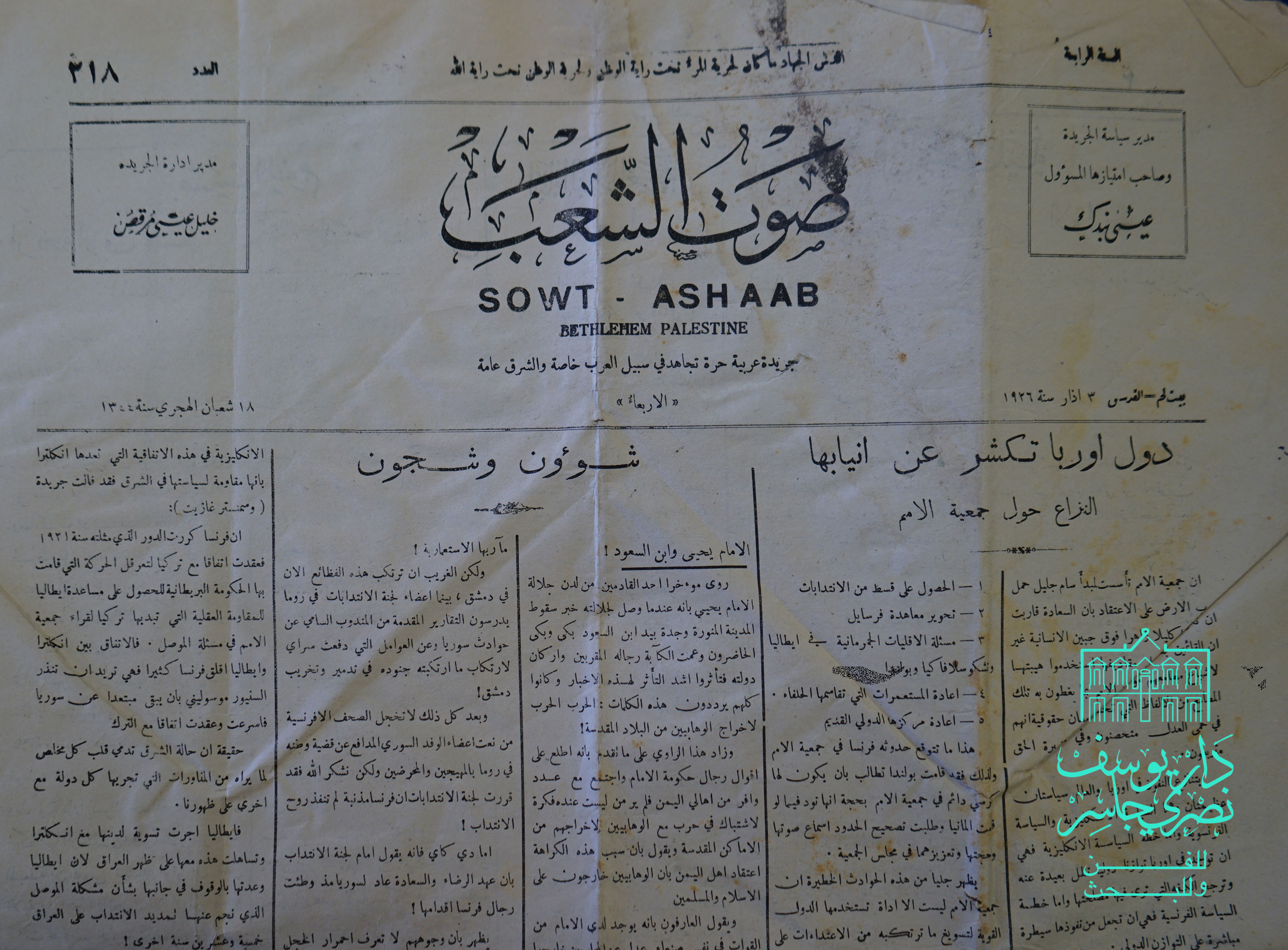 Photo: Emily Jacir 2018
Photo: Emily Jacir 2018
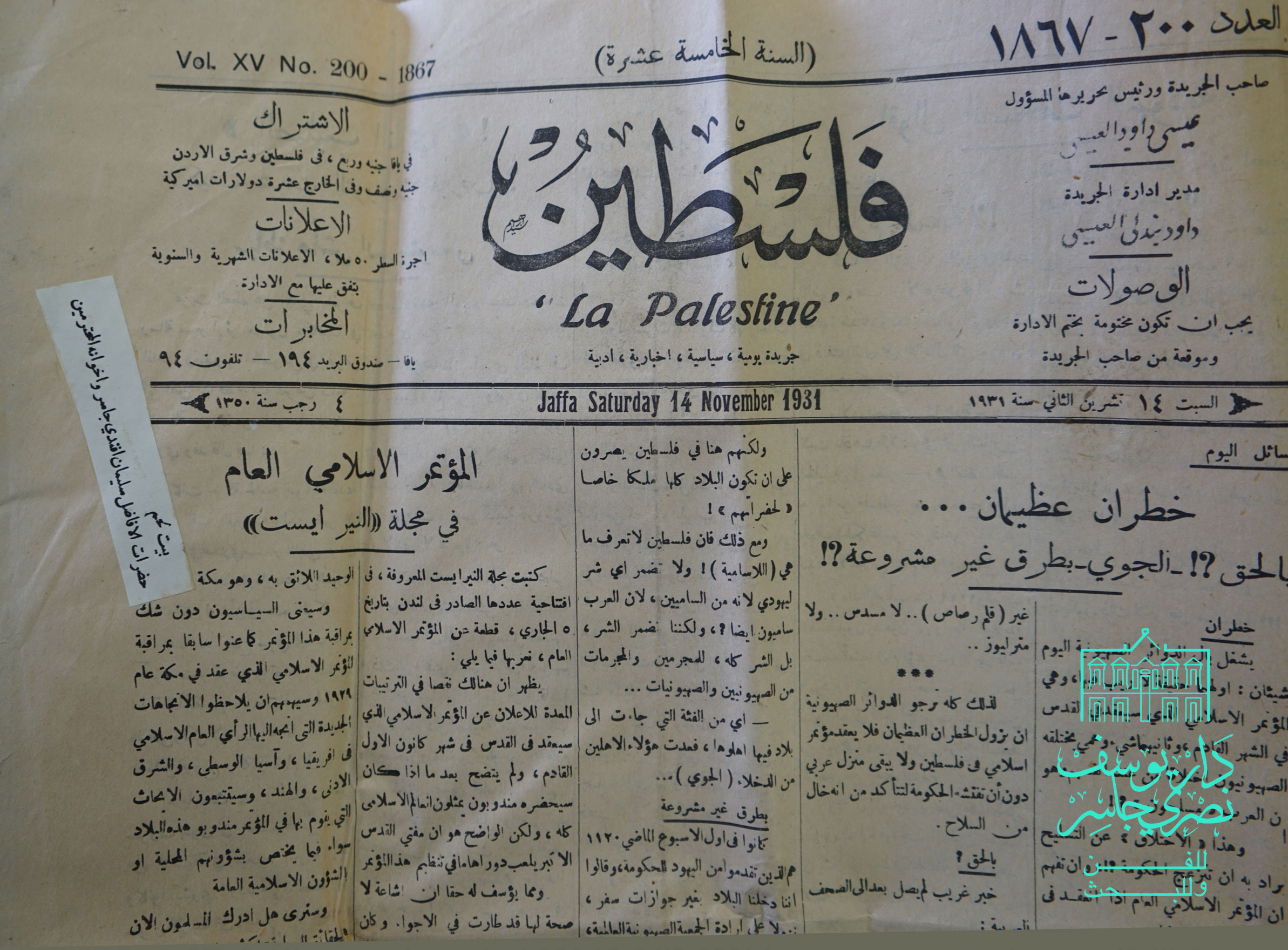 Photo: Emily Jacir 2018
Photo: Emily Jacir 2018
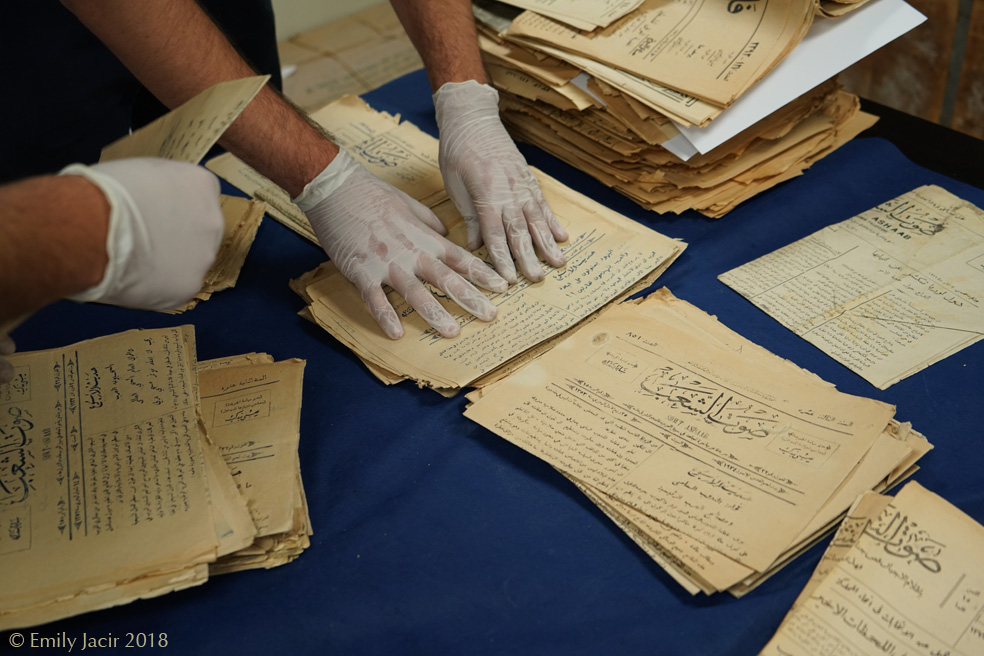
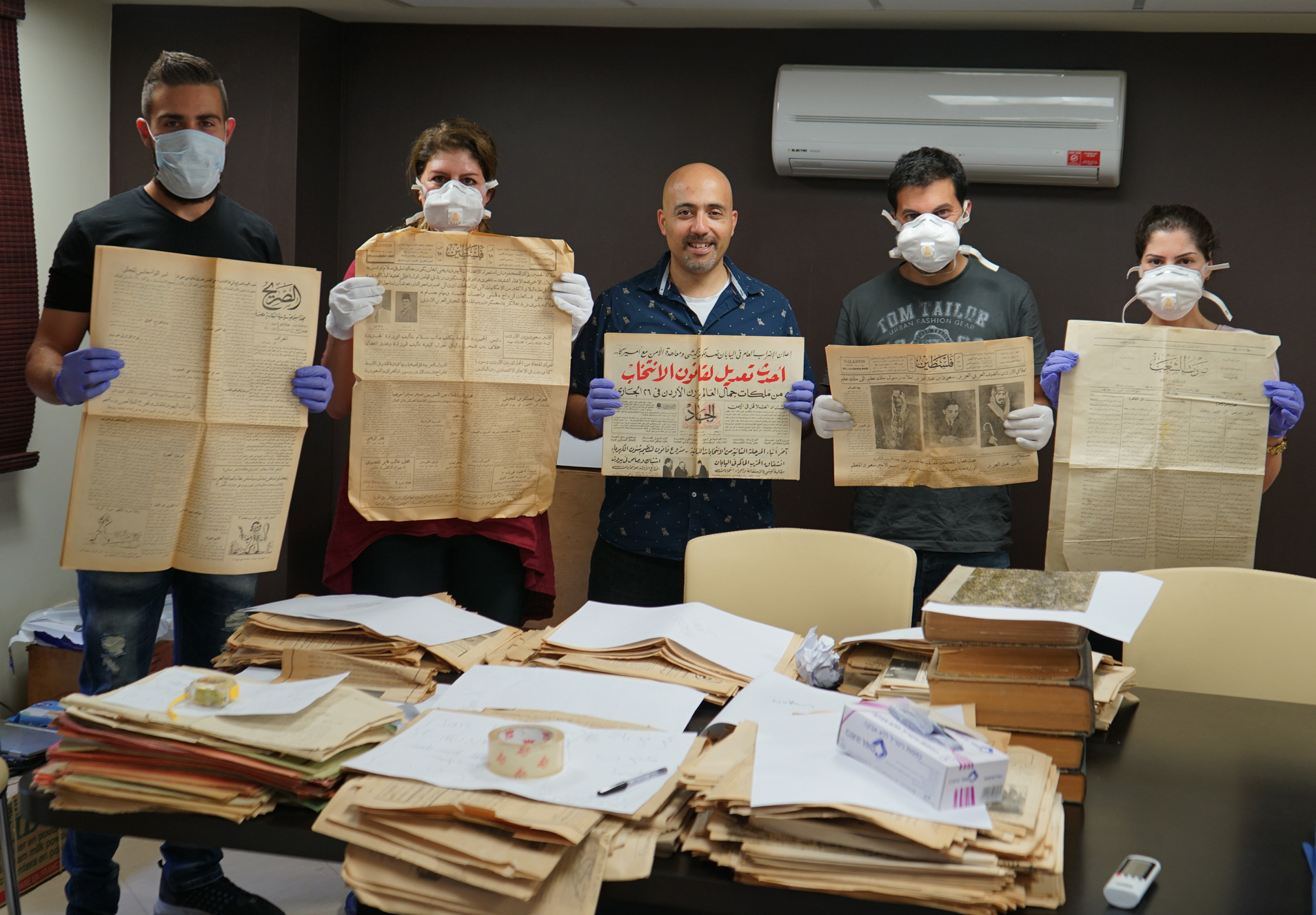
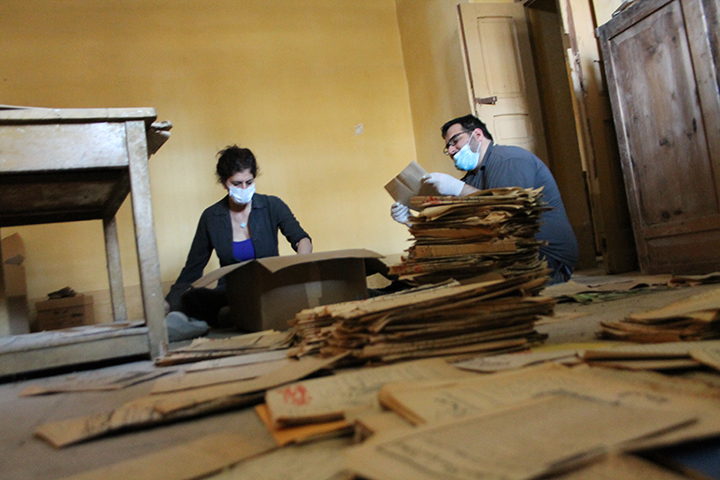
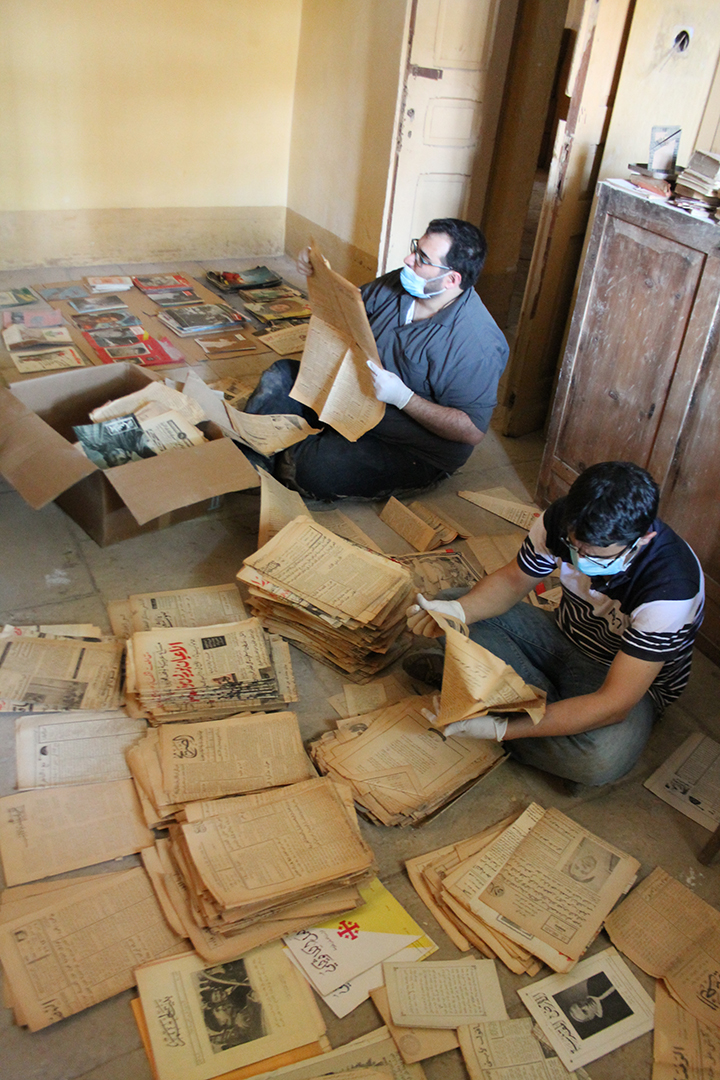
2015
We will always be grateful to our very first patron who made this project possible and believed in us before anyone else with his generous gift:
FAMILIA SIMAN JACIR
El Salvador, San Salvador
2017
The renovation of Dar Jacir was made possible by our 2017 Kickstarter supporters, a community of global believers in our mission.
Our deepest gratitude, love and solidarity to our Kickstarter campaign backers: because of you all, we raised funds way beyond our goal, transforming our dream into a reality.
A special thanks to Alfredo Jaar who led the way
with his generous gift.
with his generous gift.
Aaron
Aaron Cezar
Aaron Hamburger
Abdelsalam Heddaya
Abu Kanaan
Adelita Husni Bey
Ahimsa Timoteo Bodhran
Ahmad Albakri
Ahmad Ayyash
Akram Zaatari, Artist
Ala Alryyes
Aladdin Ishmael
Alex Eisenberg
Alex Robinson
Alex Seggerman
Alexander and Bonin
Alexander Hawson
Alexandra Stock
Alfie
Alfredo Jaar, artist
Ali Abunimah
Ali Cherri
Alia Al-Senussi
Aliya Cycon
Allison Raygor
Alon Koppel
Amal Ishaq
Amber Eve Anderson
Amber Fares
Amer Massimi
Amr El Abbadi
Andrea
Andrea Carson Barker
Andrew Farrington
Andrew Hoffman
Andrew Ingall
Angela
Angelina Seha
Angus Mol
Ann Brigid Clark
Ann Hamilton
Anna Badkhen, author
Anna Campbell
Annan Shehadi
Annie Fletcher
Anthony Downey
Anthony Glaister
Anya Gallaccio
Audrey
Avi Mograbi
Axel Flodin Vacher
Barbara
Bashar Al-Hamad
Blake
Brian Fernandes-Halloran
Brigitte Van Der Sande
Bryant Seibert
Burcak Bingol
Catharine Kiser
Caleb Ostrander
Camille Griffoulieres
Candice Breitz + Alex Fahl
Carol Zemel
Caroline
Carolyn Alexander
Catherine Cook
Cauleen Smith
Cecile Boex
Cecile Chong
Cesare Pietroiusti
Chantal Meloni, Law professor - (International criminal lawyer)
Chase Pashkowich
Chris
Christine
Christine Y Kim
Christophe Katrib
Christopher Parkinson
Christos V. Konstantakopoulos
Claire Tancons
Clare Davies
Claudia Juech
Claudio Lardo
Clemens Kucklick
Coco
Cocoa Cinnamon
Conflict Kitchen
Cornelis Clver
D. Campbell
D.Watson
Dagmar Painter
Damon And Erica
Dana Farouki
Daniel
Daniel Yarur
Danny Chisholm
Dave Witter
David
David Hamlet
David Lloyd
David And Peggy Cave
David J Rodriguez-Sobrino
Daviel Lazure Vieira
Debbie Clark
Deville Cohen
Diana Buttu
Dina Abu Shousheh
Dr Naomi Woodspring
Doreen Mende
Doris Bittar
Duncan Campbell
Dyala Husseini
Ed Decarbo
Elaine Bachman
Eli
Eline
Elisabeth Friedman
Elise Rasmussen
Elizabeth
Elizabeth Jones
Elizabeth Kassis S.
Ella
Emna Zghal
Eric Damon Walters
Eric Gottesman
Fatma Mohammad
Farris Wahbeh
Federica Martini
Fia Backstrom
Feren
For Diyaar & Mayaar Arraf-Shapiro
Frank
George Al'Ama
Georgina
Gianni Wise
Graham Passmore-Cox
Guy
Hajra
Hammad Nasar
Hana
Hanan
Haneen Suliman
Hani Zurob
Hannah Boast
Hassan Fouda
Heather Corcoran
Henri
Hoor
Horatiu Randasu
Anonymous
Iain Chambers
Ian Burnley
Ida Roden
Idan Cohen
Iftikhar Dadi & Elizabeth Dadi
Ijsbrand Van Veelen
Ilaria
Imani E Jackson
Ingrid van Loo Plowman
Isaac Julien and Mark Nash
Istifan and Lara Sheehi
J.T. Bromley
Jacqueline Salloum & Suhel Nafar
Jaeyong Park (Seoul Reading Room)
Jaishri Abichandani
Jamal
Jawad Hanna Salah
Jayce Salloum
Jen O'C
Jennifer Higgie
Jennifer and Osman
Jenny O'Shaughnessy
Jerilyn Tabor
Jesse Gilbert
Jessica Hodin
Jessica Morgan
Jill
Joana Villaverde
Joey
Johan Soderberg
John Adkins
John Lansdowne
Johnny Farraj
Jon Leland
Jordan Flaherty
Jorge Tacla
Joseph Malikian
Jota Castro. Artist
Joy Garnett
Joyce Ziad
Jr Farag
Julia Meltzer
Juliana Farha
Julieta Aranda, Artist
Jumana Bishara
Justin Honold
Kamran Rastegar
Kandis
Kareem Estefan
Kareem Fahim
Karen Gurney
Kate Llewellyn
Kateri O'Neil
Kathryn Gile
Kathy
Katie
Katie Bruce
Katie Hood Morgan
Katrina Weber Ashour
Keith
Kelise
Kelly Baum
Ken Arroyo Ohori
Kerry Gaertner Gerbracht
Kimberly Katz
Laleh Khalili
Larry Milliken
Laura
Laura
Laura Boushnak
laura levitt
Laura Raicovich
Lauren Jacobi
Lauren Mackler
Leeza Ahmady
Lesley
Leslie and Woody
Leyya Mona Tawil
Linda Ganjian
Linda m Hanna
Live Your Hopes
Liz Faier
Liza
Lorenzo Fusi
Lorenzo Legarda Leviste
Lori
Lori
Lucretia
Luis Oganes
Luisa Gandolfo
Lynn M Cook
Lynne Tillman
Lysley Tenorio
Mali
Maliha Haddad
Manal Ashkar
Manar Harb
Mandy Sinclair
Marcin Bazydlo
Marcius Galan
Margaret Tarazi
Marian Evans
Marianne
Mariette Meijers
Marisa Mazria Katz
Mark
Martina Bresciani
Mary Ann
Mary Leclã¨Re
Mary Nazzal-Batayneh
Maryam Monalisa Gharavi
Marwa A
Matt
Matt
Matt Craft
Matt Vieyra
Matthew Weidman
Mauricio Laffitte
May McWilliams
Maya de Rossi
Media Farzin
Megan Arney Johnston
Mel
Melanie DD
Michael
Michael Dickas
Michael Horner
Michael Rakowitz
Michael Tucker
Michaela Crimmin
Michelle Pichette
Mischa
Mohammed A A Nassar
Mohammad Khawaja
Muhammad Karim
Moukhtar Kocache
Myriam Vanneschi
Myron Selby
Naila Sabra
Naim Jadue
Naoto Sakakura
Anonymous
Natascha Kurzreiter
Nathalie Batraville
Nathan Tucker
Nawal David
Nicholas
Nick
Nicole
Nicole Jamieson
Nisa Ari
Nlus
Noah Simblist
Noemi Kahn
Noor Al-Sharif
Noor Oraidi
Nur Aman
Omar Hawit
Anonymous
Omar Kholeif
Orsola Vannocci Bonsi
Othman Benomar
Paige Sarlin
Pat
Patricia Ready
Paul Laster, artist, critic and curator
Paul Pfeiffer
Peggy Ahwesh
Peter
Peter Creticos
Petra Swais
Philip C
Pilar Palacia
Rabab Haj Yahya
Rachel Leah Jones
Ralph
Rami
Rami Heled
Rami Sarafa
Rami Shehadeh
Rania Missoumi
Ray
Reem Bader
Reese
Regine Basha
Rhoda Kanaaneh
Rhonda Elifritz-Rix
Rita
Roberto Bartolacci
Roger Frei
Rosie Nashashibi
Rossella Biscotti
Ruanne And Basel
Ruth Oppenheim
Ruthie Abel
Sabina
Sabine Brunckhorst
Sahar Mustafah, author and educator
Salih Mahmoud Jadallah
Sam Durant
Sama
Sana Odeh
Sandy Hmouz
Sarah Faruki
Sarah Glowa-Kollisch
Sarah Grace Dye
Sarah Hromack
Sarah Hussain Suliman
Sascha Crasnow
Sebastien G.
Selma Dabbagh
SH
Shane Brennan
Shanna
Sharifah Khalfan
Sharna Jackson
Shiva Balaghi
Shoshana Dentz, artist
Silvia
Simonetta
Simone Leigh
Sonja
Sophie Mayer
Stefan
Stefan Deborges
Stella Rollig
Suad Bushnaq
Sue Uhlig
Susan
Susan Youssef
Syrian lover of Palestine
Tad J. Freese
Tamar Shafrir
Tania
Tania Hershman
Tarek A. Hijaz
Tarik Kiswanson
Taryn Haydostian
Taylor Davis
Ted Kennedy
The Benevity Community Impact Fund
The Lebanese Association for Plastic Arts
Thom
Thom Powers
Thomas Davis Keppen
Tieg Zaharia
Tina Barouti
Tirtza Even
Tom and Carla Applegate
Tonio
Tore
Tsunehiko Nishiyama
Uriel Orlow
Ursula Hawlitschka, Massimo Micucci
Uzma Z. Rizvi
Vaishnavi Sundar
Val Douroux
Valeria Mancinelli
Valerie Tevere
Victoria Rogers
Village2Village
Walaa
Walid Raad
Wardeh C. Hattab
Willie Doherty
Yamini Nayar
Zachary Marcotte
Zineb Sedira
Zoe Leonard
Aaron Cezar
Aaron Hamburger
Abdelsalam Heddaya
Abu Kanaan
Adelita Husni Bey
Ahimsa Timoteo Bodhran
Ahmad Albakri
Ahmad Ayyash
Akram Zaatari, Artist
Ala Alryyes
Aladdin Ishmael
Alex Eisenberg
Alex Robinson
Alex Seggerman
Alexander and Bonin
Alexander Hawson
Alexandra Stock
Alfie
Alfredo Jaar, artist
Ali Abunimah
Ali Cherri
Alia Al-Senussi
Aliya Cycon
Allison Raygor
Alon Koppel
Amal Ishaq
Amber Eve Anderson
Amber Fares
Amer Massimi
Amr El Abbadi
Andrea
Andrea Carson Barker
Andrew Farrington
Andrew Hoffman
Andrew Ingall
Angela
Angelina Seha
Angus Mol
Ann Brigid Clark
Ann Hamilton
Anna Badkhen, author
Anna Campbell
Annan Shehadi
Annie Fletcher
Anthony Downey
Anthony Glaister
Anya Gallaccio
Audrey
Avi Mograbi
Axel Flodin Vacher
Barbara
Bashar Al-Hamad
Blake
Brian Fernandes-Halloran
Brigitte Van Der Sande
Bryant Seibert
Burcak Bingol
Catharine Kiser
Caleb Ostrander
Camille Griffoulieres
Candice Breitz + Alex Fahl
Carol Zemel
Caroline
Carolyn Alexander
Catherine Cook
Cauleen Smith
Cecile Boex
Cecile Chong
Cesare Pietroiusti
Chantal Meloni, Law professor - (International criminal lawyer)
Chase Pashkowich
Chris
Christine
Christine Y Kim
Christophe Katrib
Christopher Parkinson
Christos V. Konstantakopoulos
Claire Tancons
Clare Davies
Claudia Juech
Claudio Lardo
Clemens Kucklick
Coco
Cocoa Cinnamon
Conflict Kitchen
Cornelis Clver
D. Campbell
D.Watson
Dagmar Painter
Damon And Erica
Dana Farouki
Daniel
Daniel Yarur
Danny Chisholm
Dave Witter
David
David Hamlet
David Lloyd
David And Peggy Cave
David J Rodriguez-Sobrino
Daviel Lazure Vieira
Debbie Clark
Deville Cohen
Diana Buttu
Dina Abu Shousheh
Dr Naomi Woodspring
Doreen Mende
Doris Bittar
Duncan Campbell
Dyala Husseini
Ed Decarbo
Elaine Bachman
Eli
Eline
Elisabeth Friedman
Elise Rasmussen
Elizabeth
Elizabeth Jones
Elizabeth Kassis S.
Ella
Emna Zghal
Eric Damon Walters
Eric Gottesman
Fatma Mohammad
Farris Wahbeh
Federica Martini
Fia Backstrom
Feren
For Diyaar & Mayaar Arraf-Shapiro
Frank
George Al'Ama
Georgina
Gianni Wise
Graham Passmore-Cox
Guy
Hajra
Hammad Nasar
Hana
Hanan
Haneen Suliman
Hani Zurob
Hannah Boast
Hassan Fouda
Heather Corcoran
Henri
Hoor
Horatiu Randasu
Anonymous
Iain Chambers
Ian Burnley
Ida Roden
Idan Cohen
Iftikhar Dadi & Elizabeth Dadi
Ijsbrand Van Veelen
Ilaria
Imani E Jackson
Ingrid van Loo Plowman
Isaac Julien and Mark Nash
Istifan and Lara Sheehi
J.T. Bromley
Jacqueline Salloum & Suhel Nafar
Jaeyong Park (Seoul Reading Room)
Jaishri Abichandani
Jamal
Jawad Hanna Salah
Jayce Salloum
Jen O'C
Jennifer Higgie
Jennifer and Osman
Jenny O'Shaughnessy
Jerilyn Tabor
Jesse Gilbert
Jessica Hodin
Jessica Morgan
Jill
Joana Villaverde
Joey
Johan Soderberg
John Adkins
John Lansdowne
Johnny Farraj
Jon Leland
Jordan Flaherty
Jorge Tacla
Joseph Malikian
Jota Castro. Artist
Joy Garnett
Joyce Ziad
Jr Farag
Julia Meltzer
Juliana Farha
Julieta Aranda, Artist
Jumana Bishara
Justin Honold
Kamran Rastegar
Kandis
Kareem Estefan
Kareem Fahim
Karen Gurney
Kate Llewellyn
Kateri O'Neil
Kathryn Gile
Kathy
Katie
Katie Bruce
Katie Hood Morgan
Katrina Weber Ashour
Keith
Kelise
Kelly Baum
Ken Arroyo Ohori
Kerry Gaertner Gerbracht
Kimberly Katz
Laleh Khalili
Larry Milliken
Laura
Laura
Laura Boushnak
laura levitt
Laura Raicovich
Lauren Jacobi
Lauren Mackler
Leeza Ahmady
Lesley
Leslie and Woody
Leyya Mona Tawil
Linda Ganjian
Linda m Hanna
Live Your Hopes
Liz Faier
Liza
Lorenzo Fusi
Lorenzo Legarda Leviste
Lori
Lori
Lucretia
Luis Oganes
Luisa Gandolfo
Lynn M Cook
Lynne Tillman
Lysley Tenorio
Mali
Maliha Haddad
Manal Ashkar
Manar Harb
Mandy Sinclair
Marcin Bazydlo
Marcius Galan
Margaret Tarazi
Marian Evans
Marianne
Mariette Meijers
Marisa Mazria Katz
Mark
Martina Bresciani
Mary Ann
Mary Leclã¨Re
Mary Nazzal-Batayneh
Maryam Monalisa Gharavi
Marwa A
Matt
Matt
Matt Craft
Matt Vieyra
Matthew Weidman
Mauricio Laffitte
May McWilliams
Maya de Rossi
Media Farzin
Megan Arney Johnston
Mel
Melanie DD
Michael
Michael Dickas
Michael Horner
Michael Rakowitz
Michael Tucker
Michaela Crimmin
Michelle Pichette
Mischa
Mohammed A A Nassar
Mohammad Khawaja
Muhammad Karim
Moukhtar Kocache
Myriam Vanneschi
Myron Selby
Naila Sabra
Naim Jadue
Naoto Sakakura
Anonymous
Natascha Kurzreiter
Nathalie Batraville
Nathan Tucker
Nawal David
Nicholas
Nick
Nicole
Nicole Jamieson
Nisa Ari
Nlus
Noah Simblist
Noemi Kahn
Noor Al-Sharif
Noor Oraidi
Nur Aman
Omar Hawit
Anonymous
Omar Kholeif
Orsola Vannocci Bonsi
Othman Benomar
Paige Sarlin
Pat
Patricia Ready
Paul Laster, artist, critic and curator
Paul Pfeiffer
Peggy Ahwesh
Peter
Peter Creticos
Petra Swais
Philip C
Pilar Palacia
Rabab Haj Yahya
Rachel Leah Jones
Ralph
Rami
Rami Heled
Rami Sarafa
Rami Shehadeh
Rania Missoumi
Ray
Reem Bader
Reese
Regine Basha
Rhoda Kanaaneh
Rhonda Elifritz-Rix
Rita
Roberto Bartolacci
Roger Frei
Rosie Nashashibi
Rossella Biscotti
Ruanne And Basel
Ruth Oppenheim
Ruthie Abel
Sabina
Sabine Brunckhorst
Sahar Mustafah, author and educator
Salih Mahmoud Jadallah
Sam Durant
Sama
Sana Odeh
Sandy Hmouz
Sarah Faruki
Sarah Glowa-Kollisch
Sarah Grace Dye
Sarah Hromack
Sarah Hussain Suliman
Sascha Crasnow
Sebastien G.
Selma Dabbagh
SH
Shane Brennan
Shanna
Sharifah Khalfan
Sharna Jackson
Shiva Balaghi
Shoshana Dentz, artist
Silvia
Simonetta
Simone Leigh
Sonja
Sophie Mayer
Stefan
Stefan Deborges
Stella Rollig
Suad Bushnaq
Sue Uhlig
Susan
Susan Youssef
Syrian lover of Palestine
Tad J. Freese
Tamar Shafrir
Tania
Tania Hershman
Tarek A. Hijaz
Tarik Kiswanson
Taryn Haydostian
Taylor Davis
Ted Kennedy
The Benevity Community Impact Fund
The Lebanese Association for Plastic Arts
Thom
Thom Powers
Thomas Davis Keppen
Tieg Zaharia
Tina Barouti
Tirtza Even
Tom and Carla Applegate
Tonio
Tore
Tsunehiko Nishiyama
Uriel Orlow
Ursula Hawlitschka, Massimo Micucci
Uzma Z. Rizvi
Vaishnavi Sundar
Val Douroux
Valeria Mancinelli
Valerie Tevere
Victoria Rogers
Village2Village
Walaa
Walid Raad
Wardeh C. Hattab
Willie Doherty
Yamini Nayar
Zachary Marcotte
Zineb Sedira
Zoe Leonard
2018
Initial programming and establishment of infrastructure was supported by the A.M. Qattan Foundation through the ‘Visual Arts: A Flourishing Field’ Project, with the generous support and implementation of the Institute for Palestine Studies.
2019
Our project space in Bethlehem was generously donated by Yusuf Nasri Jacir.
Open Society Foundation (OSF) supported operational and institutional development expenses for the sustainability of the organization.
Through the Arab Fund for Arts and Culture (AFAC), Dar Jacir received funding for the program “Cultivating Community Ownership of Art and Space”.
Residencies and projects were supported by: SharjahArchitecture Triennial, the Consulate General of Italy in Jerusalem, Yusuf Jacir, Nabil Jacir, Nicolás Jaar, and ZahiKhouri.
Initial programming and establishment of infrastructure was supported by the A.M. Qattan Foundation through the ‘Visual Arts: A Flourishing Field’ Project, with the generous support and implementation of the Institute for Palestine Studies.
Individual donations by Doris Bitar and others helped keep our lights on.
We are grateful to all the artists and team members for their continuous support and solidarity with in-kind contributions towards our programs. We acknowledge their time, knowledge and work that has been invaluable to our community.
